#-another victim's story. i want to make it very clear that while there are parallels in stories of abuse-
Text
and obviously this is by far the least important part of ANY of this, but i'm going to pretty strongly dissociate myself from anything relating to that smp-- mostly for my own mental health (again, not to center myself here). as for CS, i would like to continue it, though obviously the disclaimers again will be heavy. it is a story i wrote to cope with abuse, and if fanworks like that are called to be stopped then i will obviously rethink things. but i will give it a lot of time to figure out how to meaningfully create something from a piece of media created by unfathomably shitty people, and i'd like to be able to continue writing for the message that CS was set to convey.
again, this is not the focus of the conversation, but i just wanted to say that since i am online for once and i figure i may get an ask or two about it.
#nightmare.personal#nightmare.cough-syrup#as an update for folks since i do typically discuss my own personal life on this blog#i'm currently in the stages of questioning whether or not i have CPTSD#and after a few conversations occurring the last couple of months i've been keenly in touch with the various-#-abusive relationships/situations i've had in my life that i did not ever recognize consciously.#people seem to be handling this situation far better than past occurrences in this general sphere.#but i cannot emphasize enough how fucking difficult it is to speak out about these things.#those in my life were very selective about what abuse they let be shown publicly versus what i could never speak about#and i again am so in awe of shubble's strength in acknowledging something like this given how public of a figure her abuser is.#i hope he rots and i hope she heals. that's about where i'm at as i hope everyone is.#(and also if i post a bit about my mental health in coming days note that that is not an attempt to detract from-#-another victim's story. i want to make it very clear that while there are parallels in stories of abuse-#every abuse victim's story is theirs and is not to be trivialized or collapsed in any broader way.)
20 notes
·
View notes
Text
Bucchigiri Utena Parallel-Wannabe Heroes and the Illusion of Fairy Tales
Apart from the NNL segments, I've also had some thoughts on the Bucchigiri storyline and it's parallels to the themes of Revolutionary Girl Utena. And this time my focus as been on Matakara, who has often been hailed as being the true protagonist and hero of the story because of his honorable, kind-hearted and proactive qualities. Much like Utena herself.


And like Utena, the two share a somber backstory where they held on to fairy tale beliefs to help them overcome their hardships and grow into the heroic figures they wish to be. But what they don't know is that they naively followed these tales without realizing the misinterpretations of those beliefs that have been passed down for generations and would soon become victims of the fairy tale figures that once inspired them.
But before I can delve into that story, we need to talk about this story.
Note: This post will contain MAJOR SPOILERS from the Revolutionary Girl Utena anime. If you still haven't watched it and want to be unspoiled, then please refrain from reading this until you've seen it. If that doesn't bother you, then go on ahead. Also, I would strongly recommend speaking with a friend or a reliable user about the dark and trigger-worthy content featured in Utena before watching. It's a great show but it does get DARK.
Also, there's another user who's planning on making an analysis post comparing Matakara and Anthy Himemiya so keep an eye out for that if you're interested in more Bucchigiri-Utena parallels.
Part 1: Origins of an Orphan
To start, Matakara's backstory and his idolization of Arajin has multiple similarities to Utena's backstory. For the purpose of this section, I'll be using the version that was shown to us in Episode 1 and not the true version.
"Once upon a time, many years ago, there was a little princess and she was very sad. For her mother and father have died."
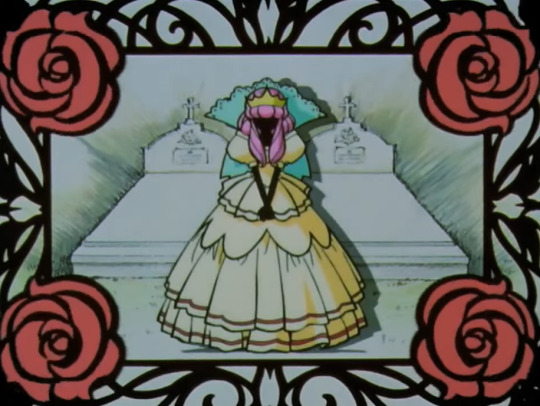
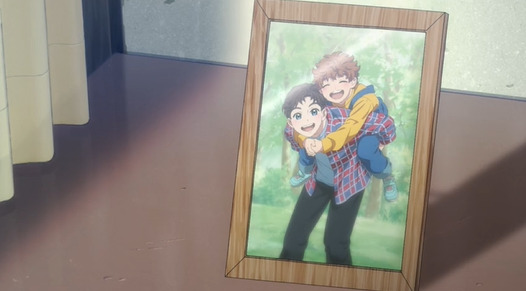
The first piece of info that Utena gives us is that she was an orphan and was in despair because of her parents' deaths. Though Matakara's own parents haven't been brought up nor has it been explained what became of them, it's clear that he lost them at an early age. And while he did have his older brother and his presumed relatives to watch over him, this did very little in helping Matakara overcome his grief or escape the shadows that haunted him since he was little.
"Before the princess appeared a traveling prince riding upon a white horse. He had a regal bearing and a kind smile. The prince wrapped the princess in a rose-scented embrace and gently wiped the tears from her eyes."

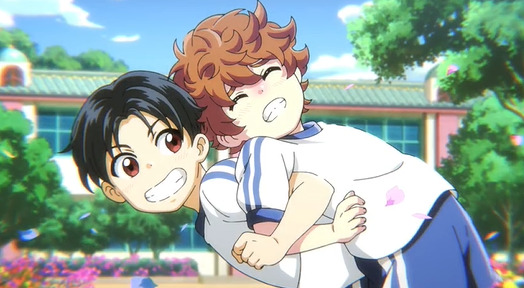
While lacking the regal bearing and white horse, Arajin was the traveling prince who came into Matakara's life and inspired hope and light within him. As shown in their flashbacks, he was always a friendly and cheerful boy who radiated confidence and spirit. A true hero that Matakara could look up to and help him overcome his sorrow.
"Little one, he said, growing up alone in such deep sorrow, never lose that strength and nobility. Even when you are a young lady. I give you this to remember this day, we will meet again. This ring will lead you to me one day."
The crux of Matakara and Arajin's friendship was their desire to train and grow into becoming true Honki people. Warriors with strong hearts and did not flee from battle. Arajin genuinely saw that Matakara had that potential and encouraged him to train alongside him.
And what's more noteworthy is that the two are given a token to immortalize the moment. Utena is given a rose ring to remember the prince and her own nobility while Matakara is given a friendship stone to remember their bond as future Honki People. Even as their fated princes leave, the two heroes carry those precious tokens well into their adolescence years, never forgetting their mission of becoming the people they want to be.


It could also be argued that Mitsukuni, his older brother, could qualify as the prince in this scenario as he inspired him to stay strong in the face of adversity. Such as in Episode 8 where he explained the creed of the Honki and how he inspired his little brother to be brave like them. He even brings up their creed to Matakara just before he's hauled away to the big house.

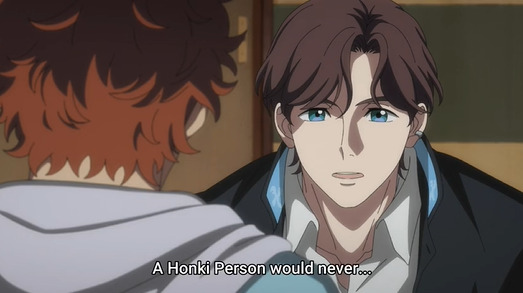
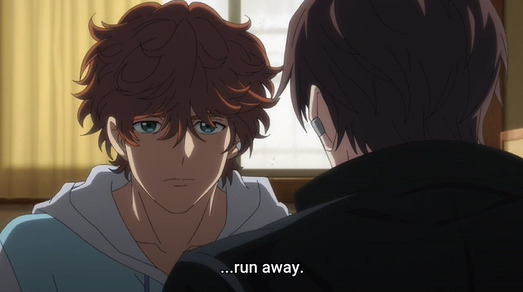
"Perhaps the ring the prince gave her was an engagement ring. This was all well and good but so impressed was she by him that that the princess vowed to become a prince herself one day."
So the cherished prince rides off into the world leaving Utena alone, much like Arajin and even Mitsukuni would leave Matakara alone because of their respective issues. But rather then succumbing to despair, the two heroes resolved to maintain the noble spirit that those heroic figures saw in them. Utena went on to become a prince herself while Matakara would become someone worthy of being a Honki person. Though Matakara struggled more on his journey given how he threw himself into bloody battles while being alone, he would eventually be adopted into the Minato Kai Gang and become closer on his path to becoming a Honki person.
And just before we can go straight to Utena's story in the present, the fairy tale closes with a question to the viewer.
"But was that really such a good idea?"
For first time viewers, it's easy to interpret this question about Utena, a girl, becoming a prince since it defies traditional gender roles and what is expected in classic fairy tales. But as the RGU story progresses, we see that the concern comes not from a girl becoming a prince but more on the problems that come with being one.
Two in particular stand out. The first is that men who become princes usually use those roles for the sake of superiority and having control over women. They lack the nobility a true prince should have and relish in the title because of it's power and privileges. The second problem, and the one that this analysis post will focus on, is how princes who live up to those roles are exploited by the people they try to protect.
Part 2: The Truth That is Twisted by Time
All fairy tales, legends, myths and stories which have been passed from one generation to the next. And as the years go by, those stories are often subject to adaptations based on the preferences of the storyteller or how society uses those tales to explain their respective beliefs. A common criticism is how most fairy tales have more imaginative elements in play and avoid the grittier elements that the tale originally used (Ex. Cinderella got her dresses from a tree instead of a fairy godmother and her stepsisters chopped off parts of their feet to get the slipper to fit, Aladdin used African slaves as part of his prince con).
And we see those changes in adaptations in the fairy tales Utena showcased that omit or warp the truth to the ones who hear of them.
Such as in Utena's origins, we're told that it was only a prince who inspired her to become one so she can reunite with him one day. But the truth was that her decision was because she met Anthy who was suffering from the hatred of humanity. And the only way to rescue her was to turn into a prince whom she could believe in.
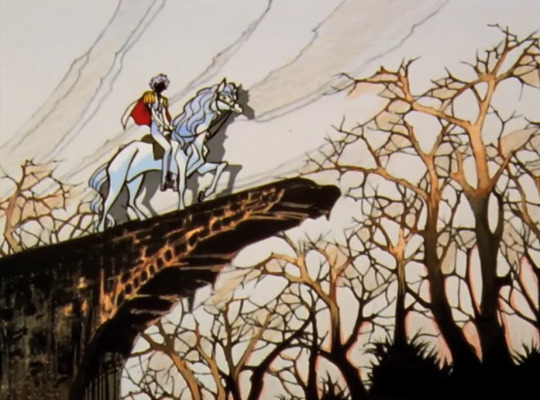



We also see a new adaptation in the backstory of Anthy and Akio which is now known to the world as The Tale of the Rose. The world remembers their story involving a powerful and perfect prince who was stolen from them by his sister who turned into a wicked witch out of jealousy. But the truth was that Anthy sealed him away not out of spite but out of love and concern as her brother was being exploited and over exhausted by a massive, unsatisfied world who overly-depended on him.

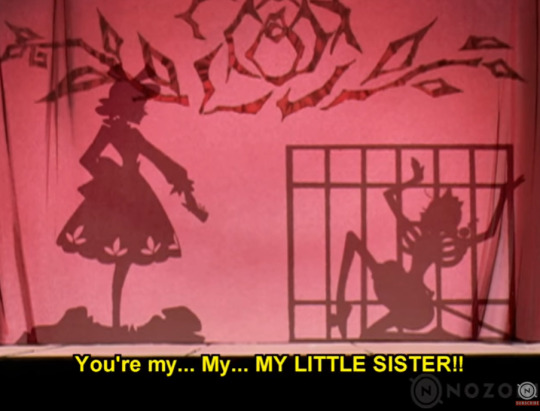


So as Utena demonstrates, the fairy tales we start out learning about aren't exactly as true as their origins demonstrate. They often omit or do away with the more tragic and gray aspects of the characters in those stories. This is all well and good, but what does that say about the Honki People?

Right in Episode 1, we're told that they're courageous and valiant fighters who train nonstop and pour their heart and soul into battle. Despite being brushed off as a simple old story in the present day, their legends and battles prove worthy enough of recognition. They have a temple in their honor, Arajin and Mataraka trained to become like them, and even the city is named after them. The narrative does a decent job in explaining the concept of the Honki People, but what about the people that inspired those legends?
As we see in Episode 9, we learn that Senya and Ichiya actually started out as ordinary humans who dedicated their lives to training and fighting one another, hoping to become a true Honki Person. It's stated that Ichiya was training himself to be a Honki Person so the legend was already around when the two of them were only boys growing up in a Middle Eastern town. And fitting the Aladdin parallels, Senya started out as a simple street rat with no family or home to call his own. And after meeting someone as cool, powerful and inspiring as Ichiya, he decided to spend his life alongside someone he could call his friend.
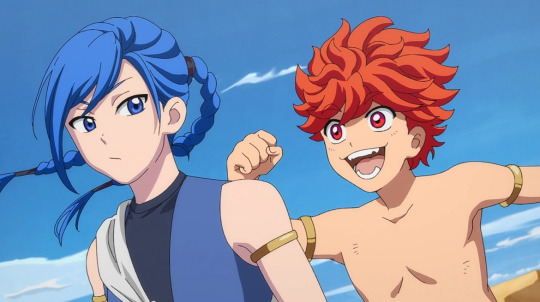
A rather somber element is that while the whole world grew up learning and embracing the Legend of the Honki, none of them actually knew who those Honki People were or what their past lives were like. Would it even matter to them how they started as humble street urchins with no family or home to call their own? They knew what they turned into, but they never stop to think about who these legends started out as or what their backstories or even their names are.
But what's more tragic is what became of Ichiya, the one who inspired Senya. Though we still don't know the exact details for what Senya did that tarnished their friendship, it ultimately impacted his best friend for the worst, corrupting his heart and letting him be filled with hatred and contempt. He no longer valued friendship like he did when he was human and views it as a weakness that must be purged. Perhaps becoming a true Honki Person wasn't all it's cracked up to be given how they're bound to pistols and made to serve whoever finds him for thousands of years.
It's akin to the Rose Prince who's powers were sealed away by Anthy in a desperate act of love leaving him unable to save the world like he used to. Only because of his powerless state did the Prince lose his heart and became a cruel, manipulative and spiteful monster who longed to reclaim what once belonged to him. He would even resort to inflicting every form of abuse imaginable onto his sister as "punishment" for what she did to him. (And yes I do mean every form so please keep that in mind if you haven't seen Utena yet!)
The hero who was glorified and admired in their respective tales loses their nobility in real life, allowing themselves to be corrupted and be filled with new desires of revenge and power. Transforming into the opposite of what they represented in the generations that told their stories. Simply put, they become a villain.
A villain who is...
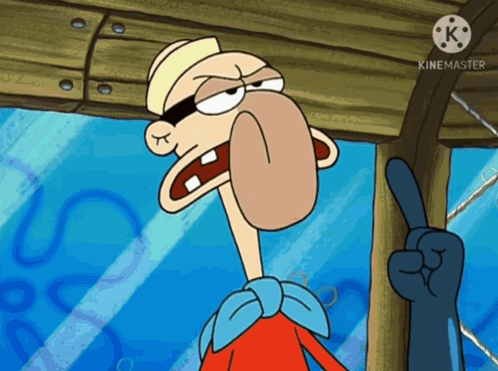
Part 3: The Virtuous Victim Turned Vile Villain
Bucchigiri and Revolutionary Girl Utena are shows that share the themes of fairy tales while deconstructing and subverting tropes associated with them. One of which that the two share is playing on the idea of a heroic or fairy tale archetype (the genie and the prince) becoming the villain of their respective shows. It's even more ironic that the true heroes of those series would start out being inspired by adaptations of them that portrayed them in a positive light only for to fall prey to their schemes when they meet them in real life. Bucchigiri has Ichiya, a true Honki Person that Matakara heavily looked up to, and Utena has Akio, the Fallen Prince Dios who led the sad princess on the path to becoming a noble prince.

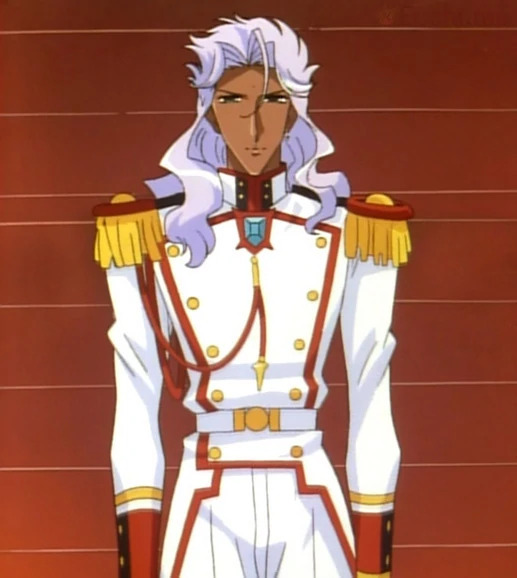
Each of them started out as the ideal fairy tale figure that helped the heroes when they were only children who confronted sadness and loneliness at a young age. But now that they're older and are meeting with them, they end up falling victims to the fairy tales they initially admired and tried to become. And neither of them realize that they're being used as it happens.
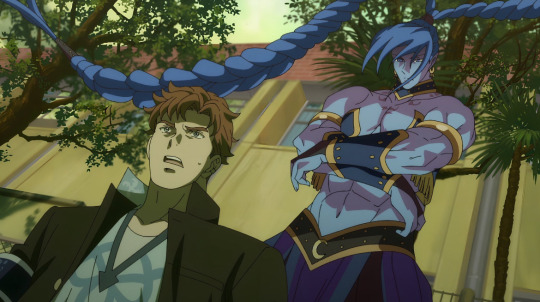
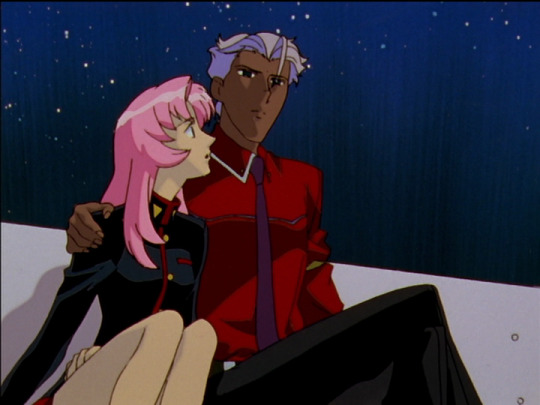
Ichiya's goal is ultimately to merge with Matakara to take over his body and exact his revenge on Senya. As to what Ichiya's motives are after taking his revenge aren't clear, but what is clear is that Matakara will lose himself after being completely possessed. And because Matakara is suffering through his feelings of loneliness and his childhood friend's true nature, he doesn't even notice how Ichiya is manipulating him to improve the merge rate.
Akio's goal has been to groom Utena into producing a noble heart that can help him reclaim his original powers, even leading her in an intimate relationship to further manipulate her. Should he succeed, then he'll discard Utena and move with his life as Prince Dios once again. If not, then he'll discard her and find another person to groom. And Utena doesn't realize this as she's led to believe that he's the prince who once saved her from despair and she'll get the happily ever after she believed will make her content.
The scary part about this, is that they're not the first victims to fall prey to their wicked schemes.
Though it hasn't been confirmed on Ichiya's side, it's heavily implied that he's bonded with other people who found his magic pistol before taking full possession of them. Given how he's lived for thousands of years and initially resided in a public Honki temple, there's no way he would have not been found by some unlucky sap. His common knowledge of possession would suggest he's done this before and has seen the unfortunate results of the person he takes control of, which he mentions to Akutaro.
As for Akio, he also has lived for thousands of years and organized constant Rose Duels in the vain hope of choosing one lucky winner to steal their heart so he can break. Using his sister as a prize to be one, there have been countless tournaments held with the hopes of finding the right target that can help him regain his powers from the Rose Gate.
Alas, neither villain was successful with their attempts given that they've turned their sights on the new generation of heroes to continue their cursed wishes that have lasted for centuries.
And speaking of wishes, remember how I brought up in Part 2 how fairy tales were much darker compared to the more enchanting stories we grew up with?
Well thanks to a peculiar finding by @mahoromouse, I came to realize something about Ichiya and possibly Honki people in general. They're not even genies, they're djinn.
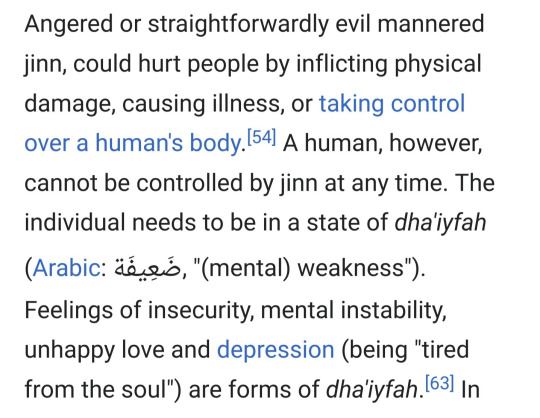
Contrary to the Western media's adaptation of genies as whimsical, playful, wish granting spirits who are voiced by beloved comedians, djinn were actually neutral spirits who were born from fire and were able to wander the Earth like humans do. That said, there are some djinn who grow stronger when interacting with negative emotions found in a human being. It's even said that they can inspire greater levels of negative emotions in a human that they target. Much like how Ichiya is cultivating Mataraka's anger towards Arajin and his fears of the shadows that haunt him.
And how fitting it is that from the moment Senya was introduced to us, Arajin and the audience interpreted him as a genie. Especially given that Senya even offers him a wish while proclaiming that "Honki" can also be spelled to make "Majin" 魔ま人 which in Japanese means "demon person" or "magical person". But have we actually seen Senya grant Arajin's wish of losing his virginity? While he does help the boy in getting stronger and boosting his image as a man, that doesn't mean it's gotten him very close to losing his virginity (thank goodness). And it can be inferred that Ichiya never granted Akutaro's wish despite having stayed by his side during his reign as the NG Emperor.
Given how the Western's portrayal of genies have been popularized and glamorized for years, we have easily forgotten the true origins of genies or djinn and the grittier aspects associated with their backstories.
Conclusions
The theme that the two shows share is how a child who was in a dark moment in their life was inspired by a fairy tale to help them find the light. And so touched were they by the heroes in the stories that they decided to become just like them. But as their respective shows demonstrated, that wasn't a very good idea. The Prince and the Honki Person they once admired turned out to be monsters who resolved to exploit them and reclaim something that was lost to them many years ago. And because they grew up with the romanticized and ideal versions of their idols, they never realized the truth about them which was lost in time mixed with ongoing adaptations that omitted their pasts making them more acceptable to the world.
As for whether Matakara will be saved from Ichiya's corruption while still gaining a heart that does not flee, I cannot say. But as it stands, it looks like Arajin will need to be the one to come in and save the boy he once inspired and who still holds dearly in his heart. And just like I mentioned in my last NNL segment, maybe their friendship won't be the same anymore despite defeating Ichiya. Maybe Matakara will still harbor negative feelings to his friend for how he was mistreated and abandoned for so many years. But much like how Utena ended on a hopeful ending, I believe the same thing can happen in Bucchigiri.
And those are my thoughts on the matter. It's been a great while since I wrote an analysis post this big so thank you if you committed to reading all of this. So what do you think of these themes? If you agree or disagree with anything I've written, please feel free to reblog and/or comment with your own ideas. Thank you and may you have a great day/night!
#bucchigiri#bucchigiri?!#revolutionary girl utena#rgu spoilers#matakara asamine#utena tenjou#arajin tomoshibi#mitsukuni asamine#ichiya#senya#akio ohtori#anthy himemiya#fairy tales#analysis#eddy's post#loving these parallels#anime#long post
67 notes
·
View notes
Text
Okay, I was going to at least read through the first volumes in their entirety before typing any of this up and analyzing it, but the parallels between these two series is so insane already. I have so much to say about just the first chapters of each work, so here's my first rambling about the Jujutsu Kaisen and Bleach parallels (also sorry about the wonky ass angles and shadows, I'm just taking pics of my physical volumes for this)
The parallels between Bleach and Jujutsu Kaisen are honestly fascinating, but for me, the most interesting one, is how Ichigo and Yuuji exist as protagonists. Despite having such similar circumstances, and such a similar world, they are developing in opposite directions, and have an almost inversed story line to one another, and these first two chapters of the series set all of that up brilliantly.
Initially, when I considered the similarities and parallels between both stories, I thought they might be superficial. But reading and comparing these two chapters side by side, all the connections were so interesting to me! Not just in the writing and storytelling itself, but even in the set up of the pages and manga panels!
The very first pages of both series are setting up such a similar concept, and even mirror each other visually
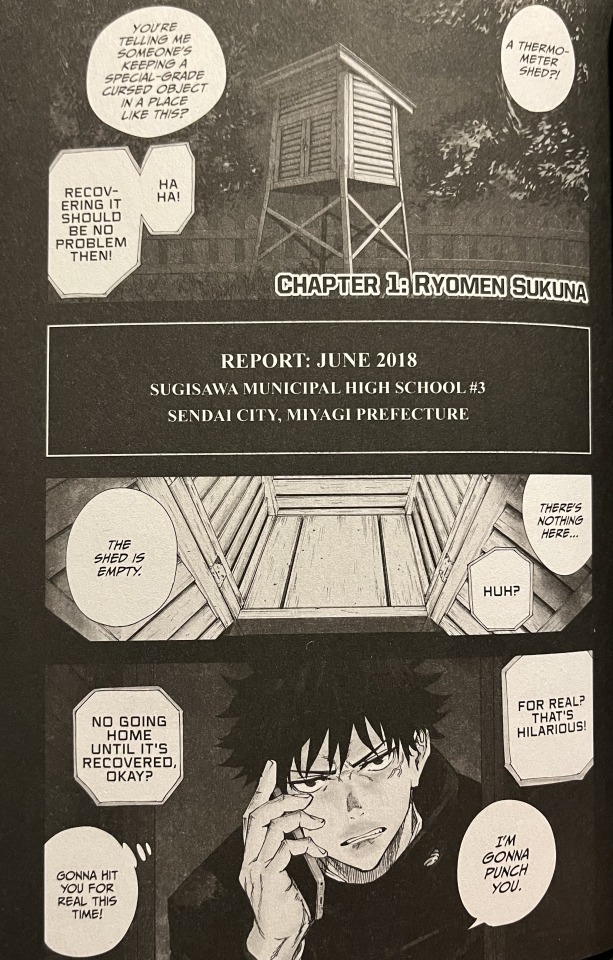
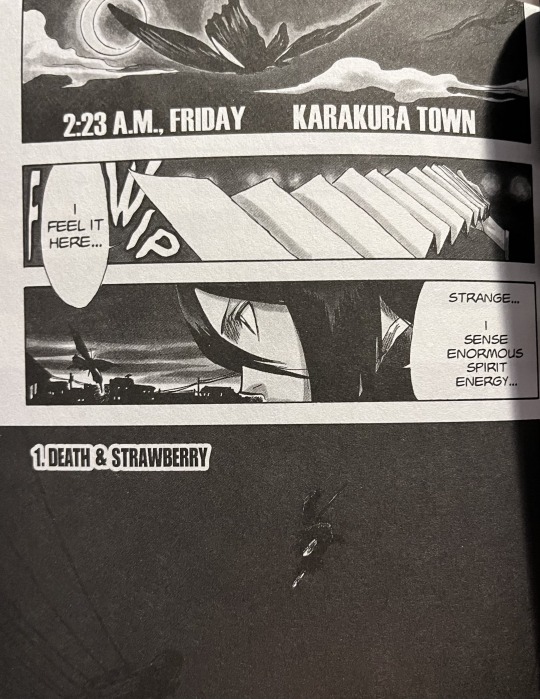
These first panels were what made me consider the parallels not just between Yuuji and Ichigo, but Megumi and Rukia as well, which I hadn't thought about until now. I have a lot of thoughts on them, but I want to do a separate post centric on them later (specifically, a lot of comparisons of the Kuchikis and Zenins). But in this first chapter, Megumi and Rukia both serve as the catalyst for our protagonists.
Of course, this is a very popular and standard shounen trope. Our MC will meet someone involved in a different world, and this character will, in one way or another, drag them into it.
However, I think the Megumi and Rukia parallels run far deeper than that, and it's partially due to the drastic similarities of Ichigo and Yuuji.
Both Yuuji and Ichigo make a decision to irreversibly change themselves because Megumi and Rukia save their lives at the expense of themselves, thus putting Yuuji and Ichigo in the position to save them (and the innocent bystanders that were the initial victims of the fight)
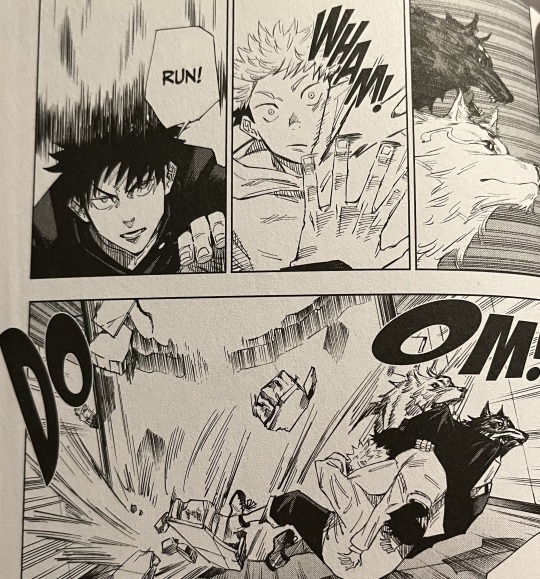
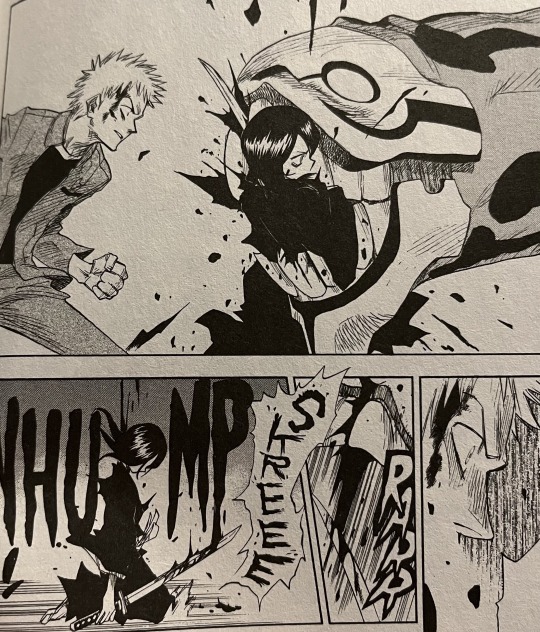
Both of them decided to sacrifice themselves to save a stranger, who ultimately would become their best friend.
However, this well meaning decision is what sets off the inciting incident of both series: Yuuji eating Sukuna's finger, and Ichigo becoming a Shinigami
But despite the similarities between these two events, this is where the tone of the series shifts. This is where the inverse between Ichigo and Yuuji becomes more clear, as well as the inverse between Megumi and Rukia
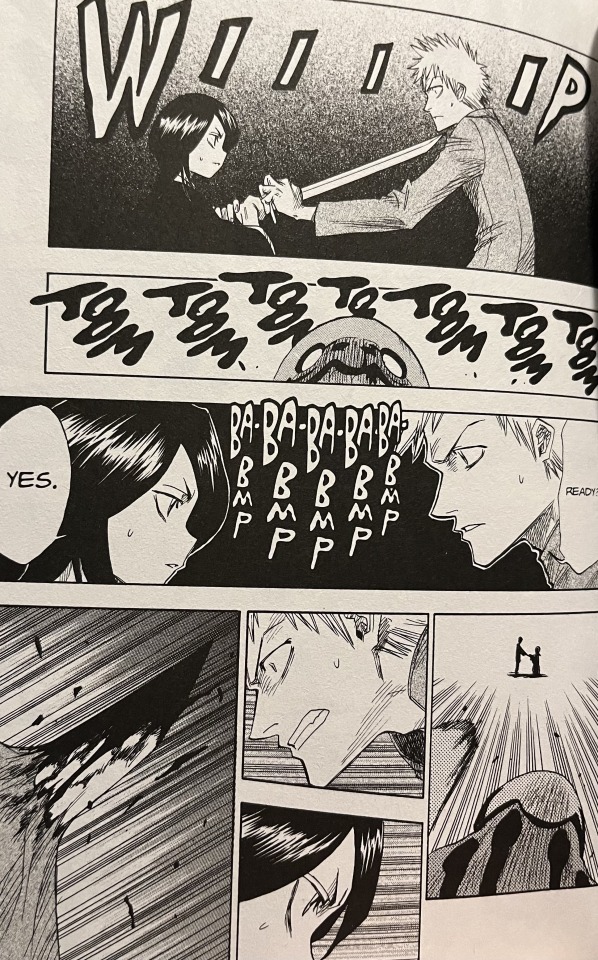
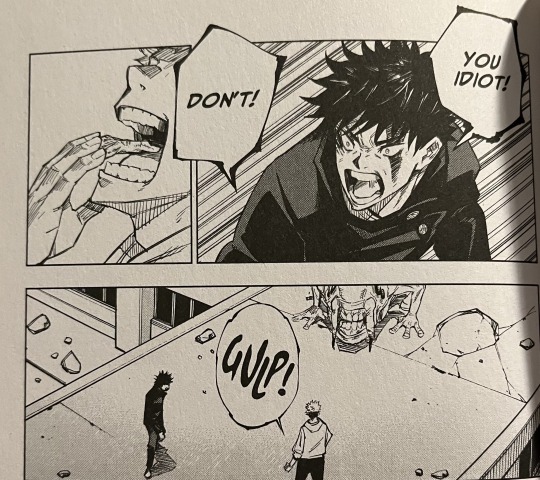
Rukia offers to bring Ichigo into her world by imbuing him with her powers.
Megumi begs Yuuji not to eat Sukuna's finger.
These first few pages of the series set up Yuuji and Ichigo's respective journeys. Ichigo meeting Rukia, and getting involved in her life ultimately led to him growing and developing as a person, and ending his story happy and surrounded by friends and family. Of course, we don't know how Jujutsu Kaisen will end, but given the current events of the manga, it seems very likely that Yuuji is going to end up broken and alone.
Which is a very interesting comparison to consider, even beyond the similarities of their origins! Ichigo began his story already fairly jaded, depressed, and angry (not that the series explored this with the depth it should have, but it was touched upon), while Yuuji began the series a happy, hopeful person. Even their introductory scenes are so starkly different, with Ichigo being involved in violence already (albeit for an admirable reason with defending a dead little girl's memorial) while Yuuji is laughing and having fun at school, a picture perfect example of the average teen.
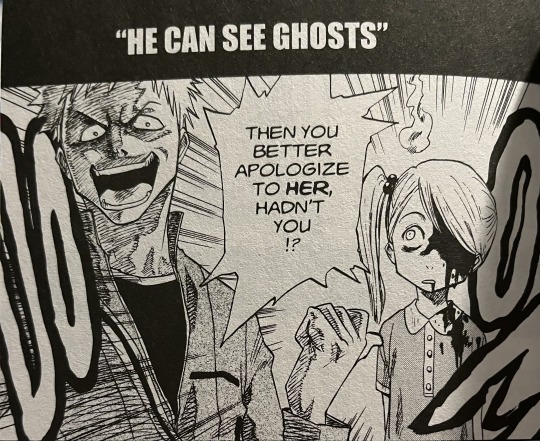
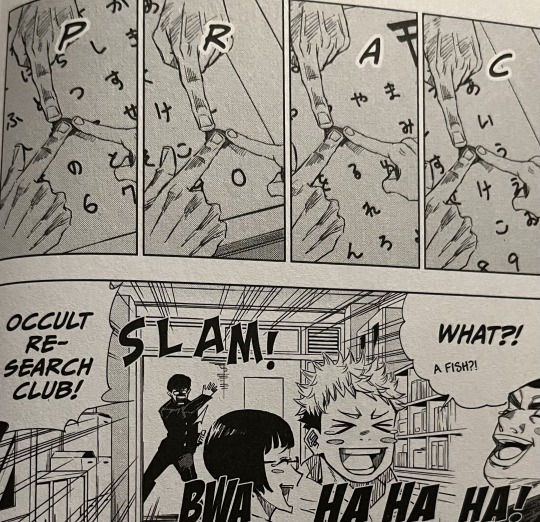
Yuuji and Ichigo are developing in opposite directions, and their origins alluded to that in all their similarities.
This is further hammered in with the ways their transformations are framed in Megumi and Rukia's eyes.
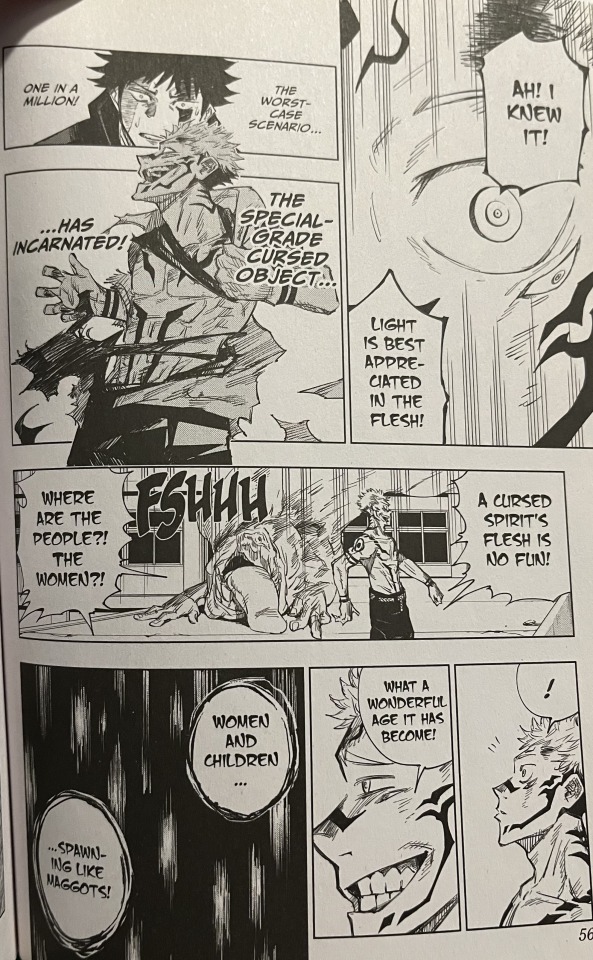
Yuuji's is seen as something disgusting and horrifying, which makes sense, considering his body has been taken over by an entity like Sukuna (and though we don't know it just yet in Bleach, this is another parallel between them, but I'll get into the similarities between Sukuna and Ichigo's Hollow later). Regardless, his change is framed as something negative, and Sukuna hammers home quickly that this is not a positive development for Yuuji.
Whereas Ichigo....
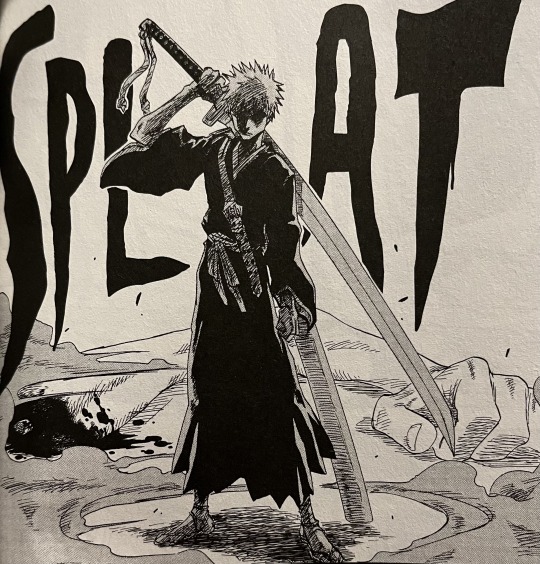
Is framed in a heroic sense with his transformation into a Shinigami. Yes, Rukia is shocked and confused by the extent of his change and his power, but she's not scared. She's not horrified. If anything, she is in awe of what he's become.
This is once more just setting up and solidifying the eventual fates Yuuji and Ichigo will face. Both of our protagonists are born from such a similar event, but are careening towards something so fundamentally different from one another. It's something that's honestly fascinating to consider!
And both chapters end off with this, a declaration of Ichigo and Yuuji having left their humanity behind (something that is discussed quite a few times in both series later on! Whether they can be considered human or not anymore)
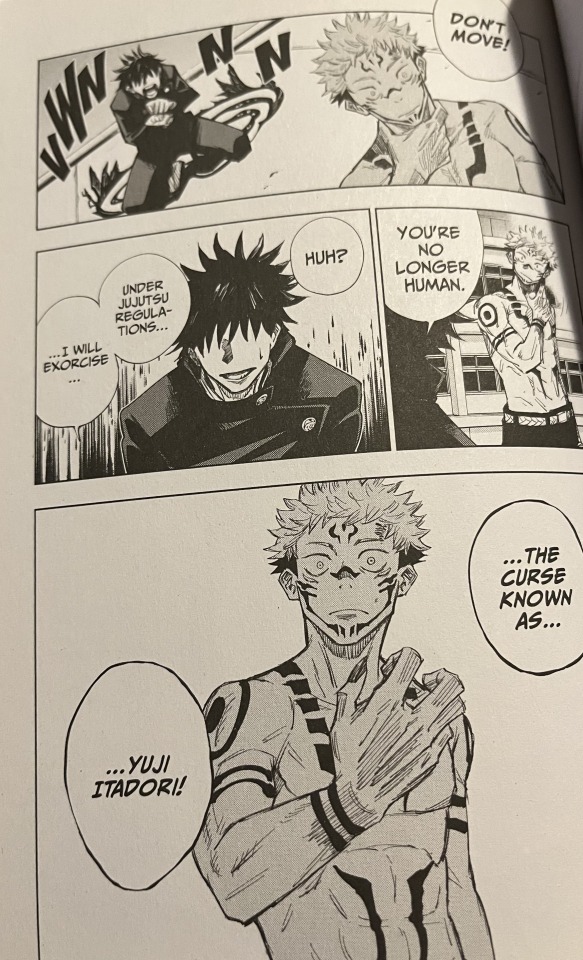
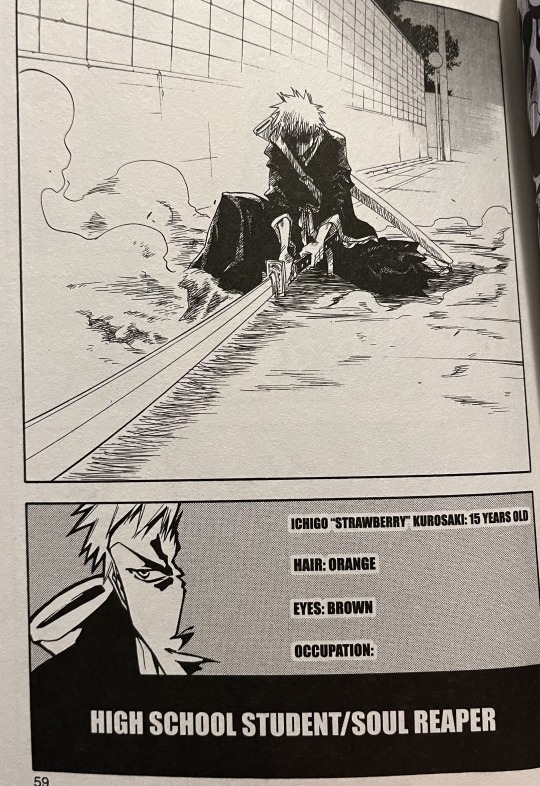
Idk! Like I said! I knew the series had a lot of similarities, just based on general plot, but I didn't realize just how they paralleled each other so much until I was literally reading them side by side. It's so neat to me! Especially as I've mentioned multiple times now, the series are working with such similar plot points and beginning from nearly the same place, they will end up somewhere so incredibly different.
And these were just things to analyze in this first chapter! I genuinely can't wait to continue reading the series together like this, and dig into so many other characters and plot points I want to compare, as well as continue comparing Ichigo and Yuuji's development and circumstances!
#jujutsu kaisen#bleach#ichigo kurosaki#yuuji itadori#rukia kuchiki#megumi fushiguro#jjk analysis#bleach analysis#long post#bleach/jujutsu kaisen comparisons#<- tag for my organizational purposes#kaz rambles
32 notes
·
View notes
Text
The Tale of Tales movie analysis (3)
After looking at the "crone" segment of the movie, let us take a deep dive into the "maiden" segment of Tale of Tales: the adaptation of "The Flea".

To make "The Flea" the story illustrating the "young girl" archetype is an absolutely fascinating subversion of the original tale because, when you look at the text of Basile, you realize that the princess is a secondary character quickly swept under the rug and dominated by the male characters. At the beginning of the tale, it is a story about the king and his flea. The princess only appears in the middle of the tale, to serve as the wife-victim of the ogre. And during the last part of the story, it is the supernatural brothers that shine, to the point the ending of the story is all about them, and not about the princess. Putting a great focus on the old sisters of "The Flayed Old Lady" was just a regular adaptation move, since they were the protagonists of the original tale - but here, making the princess the main character of her own tale is already a big twist compared to the original material.
If we compare the openings, this effort of shifting the point of view is very clear. In Basile's tale, as I said, the princess is entirely absent until she is put up as the prize of winning the guessing game. It is a story about the king and his flea and that's it. But in the movie, the princess is already here, and we are presented the character of a "bird in a cage". She loves her father, and tries to prove it to him with her music, but he gets distracted by a flea much to the chagrin of his daughter. She dreams of getting away and getting a husband, but her father refuses to let her do so, and when he finally agrees, it is by an impossible and ridiculous game which she hopes is just a ruse... Before she realizes much to her horror that her father is serious. If "The Enchanted Doe" segment presents a bad mother figure, the "Flea" segment is about the bad father.
The movie exacerbates the king's nature. He is still a selfish tyrant, but the movie removed his burst of foul anger and brutal verbal abuse when his daughter refuses to marry the ogre - instead here he begs, he pleas, he whines... And that's because in the movie, his selfish tyranny is due to misplaced love and uncaring kindness. Aka, the king is here purposefully depicted as a childish character, an excentric man so lost in his whimsical plays and bizarre games he ends up hurting all those around him without meaning to. We saw above that he dearly loves his daughter - but he keeps switching between not paying her attention when he should, and yet refusing to set her "free" by giving her to another. The treatment of the princess is set in parallel to the king's behavior towards the flea, that he takes as more than a beloved pet - almost a child substitue... And yet what does his kindness and protection results to? Overfeeding, the beast growing unnaturally big, and dying as a result of it. In the original story, the king decides to end himself the flea's life merely to get its skin, clearly seeing it as a cattle more than anything - in the movie, the beast very obviously dies due to obesity. The king overprotected it, overfed it to death - clearly hinting at the deadly smothering of his own daughter.
To further emphasize the king's childhisness, the set design and costumes clearly all highlight Toby Jones's small frame, making him look younger than even his own daughter - and further drawing a contrast with the giant "wild man/ogre". In fact, the king and the ogre are clearly meant to be seen as doubles - something which wasn't present in Basile's tales. In the movie, both men love the princess and want the best for her... While also denying her anything she wants and ruining her life in various ways (social abuse and emotional neglect for the king, physical and sexual abuse for the ogre). Both men try to act out of love and kindness, but are so self-centered they end up hurting the princess more than anything.
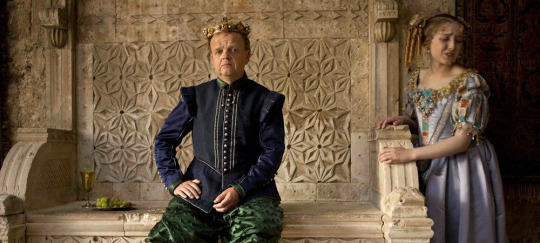
Speaking of the ogre (or the "uerco/orco"), we follow this same "realistic fantasy" approach that we already discussed for when it came to the Witch of The Flayed Old Lady. This character lacks all the traits of Basile's ogres, which are clearly supernatural beings: no obvious magical powers, no monstrously deformed appearance, no animal features... He is just a very strong giant (but a realistic giant, not a fantasy giant), and a dirty wild-man that can barely speak. In fact, almost nothing hints at him being an ogre - nothing except subtle clues here and there, clearly showing a supernatural nature, but drowned by the realistic appearances. The ogre's unnatural smell sense that allows him to say the skin is a flea (kept from the original story), his unnatural strength, his impossible lair (changed from a house of bones in a deep dark forest to a grotto up impossibly high and steep mountains), the presence of some human bones and remains in his lair (but hidden among other, animal bones - while Basile's ogres was just all about human carcasses). And it all finally explodes during the last segment, when the ogre proves himself clearly an unnatural being as he hunts the group with the same abnormal abilities most masked slasher horror villains a la Michael Myers or Jason Voorhes use against their victims.
In fact, the entire hunt segment is a very clear homage and reference to horror movies - which serves to better highlight the ogre's true nature, but also allows us to open the eyes on the king's own nature, and unravels the logic of any abusive relationship. The ogre is actually "cute". He is this gentle mute giant, who tries his best to make his home as welcoming as possible for his bride, carries her on his back all the way from the king's castle to his lair when it is clear she cannot move, tries to find the food she can like, and sincerely loves her... But these gentle, touching scenes where the princess seems like an entitled little brat for just crying and screaming at this kind and misunderstood soul, always alternate with the ogre behaving like a monster, by either raping the princess like a wild animal, or killing anyone that places themselves between him and his bride. And so, we see we shouldn't be fooled by the ogre's kind appearance and demeanors, the same way the king shouldn't be forgiven just because he is a quirky and whimsical, almost clownish figure.

And this entire story is actually the story of the revenge of the princess - and ultimately, as we see by the end, of her empowerment and rise to power by replacing or destroying the bad masculine figures. If The Flayed Old Lady depicts a very grim picture for women, subjected to the tyranny and brutality of men's lust, forced obsessively into an impossible quest for eternal youth, and even betrayed by their own sisters for greed and ambition ; The Flea is here to rather show a frail and soft young girl who, after being broken in body and mind, ultimately vanquishes and gets rid of her abusers.
It begins with how her acceptance of following the ogre begins - in the original story, it is the king's angry shouting and vile insults that force her into the arms of the uerco, but in the movie the daughter decides herself to uphold her father's deal out of spite, very clearly saying to her father she will make him pay for his bad behavior by literaly giving him what he wants - leaving him and going off with a monster. A decision which will destroy the king as we see, since not only does he revives the trauma of losing his flea-pet, but he also loses his actual most beloved "belonging" and as such ends up bedridden and very sick.
Then comes her revenge on the ogre, and this is presented through THE big twist of the adaptation. In the original story, the princess is rescued by a group of seven brothers with supernatural abilities - a traditional character-archetype of fairytales, the "gifted ones" or "talented ones". But here? The brothers are a family of circus-performers. Acrobats, junglers, tight-rope dancers, they certainly have impressive abilities - but they are entirely humans. And as such prove entirely useless when the ogre comes for them - from a strange, bizarre, entertaining magical obstacle-race, we pass into a merciless horror massacre, a series of slasher murders making the princess understand that no one can save her, and no matter how much she runs the ogre will always find her - and ultimately, only she can save herself. Which she does in the second big twist of the adaptation - the ogre ends up with his head cut-off, indeed... But by the princess herself, who pretended to give up and abandon herself to her monstrous husband to better slice his throat.
Finally, it all culminates in the final corruption/distortion of the retelling. The return to the castle. As I said before, in Basile's tale the ending sweeps unde the rug the princess to rather focus on the king, who regrets his actions, and the brothers, who are rewarded for their brave deeds. The brothers offer to the king the head of the ogre in echange for their reward - the story ends between a passing of power and belongings between the two male forces of the story, around the third (now dead) male force of the tale, all the while the female characters (the princess or the brothers' mother) are background evocations and mere pretexts. In the movie? The girl returns to her father - covered in dirt, blood and gore - show him what he did to his daughter, and it is her who brings back the head of the ogre. And it is not a happy ending. It is a reunion where everybody cries and every falls down and where nobody is happy but everybody hurt, exhausted and traumatized.
Of course, this being a fairytale movie, this is later subverted with an ACTUAL happy ending concluding the entire segment - the princess restored to a proper and happy life, her forgiven father having stepped out of the throne to become the helper and servant of his daughter, the princess becoming a queen all of her own, made stronger by her trials and becoming a powerful figure without any need of any husband or father. Through the blood and gore of this horror movie-like tale, we ultimately have the rise of the princess-maiden, frail prize, spoiled daughter, object belonging to her father ; into a strong and happy queen, who became the slayer of her own monster.
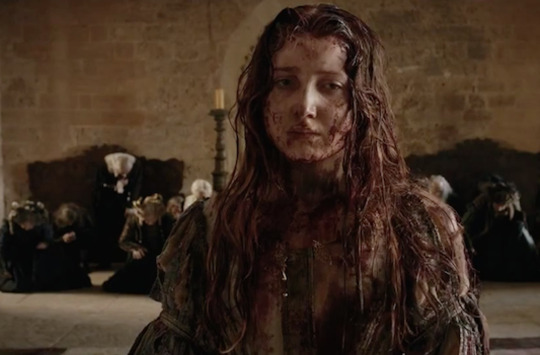
#tale of tales#pentamerone#tale of tales movie#movie analysis#fairytale movie#the flea#basile#dark fairytale
11 notes
·
View notes
Note
One of the stupidest defenses towards Bakugou's character is when his stans try to explain and defend Bakugou's words in the first chapter about suicide and justify that Horikoshi admitted that the comment went too far and that he didn't want to characterize Bakugou the way he did. But the problem for me was never the comment itself, because it could be taken as an isolated event of a child who doesn't think before speaking (this could have been reprimanded and not considered normal but a kid can do stupid things) the comment itself doeen't represent the character very much. The problem is that Horikoshi's characterization of Bakugou doesn't make us believe that the comment represents an isolated event, only in the first chapter of the manga we see Bakugou attacking Midoriya along side with others because Midoriya was defending another child who was being molested and scared of Bakugou. Also Bakugou using his quirk on Midoriya while beating him (early manga pages), the time skip to adolescence, Bakugou yells at Midoriya, uses his quirk to scare him, burns his notebook and throws it out the window and does the comment. Later upon being accepted into the UA, he threatens Midoriya to resign because he was ruining his plans and also Midoriya said that Bakugou doesn't put a hand of him in a whole year after the sludge villian (just one year of what 10 years since they met?). In his first class he uses an almost lethal blow and defends himself with "if he dodges it he won't die". During the SF he tries to make Todoroki use his power to the point of hitting him when he was unconscious (even knowing Todoroki's story which he eavesdrop).
Later, he hits Midoriya while they have to work together and unlike what happened with Sero and Mineta Bakugou doesn't get extra exercises and no one reprimands his violence towards his teammate. Then during the provisional license arc he fails due to his own ineptitude since the instructions were clear, the false victims would rate the work of each hero and Bakugou couldn't follow a simple instruction, he failed for not following the rules since the test was not so difficult. Later when he seeks to fight with Midoriya, he only complains that everything is very unfair to him and how nothing went as planned as if for some reason Midoriya owes him anything and finally after this fight he supposedly begins his redemption arc where Horikoshi continues using violence in Bakugou and Midoriya's relationship and that pushes back any growth because even the apology isn't a big deal, it's just a logical step.
What I want to say it's that Bakugou isn't characterized as a bully who only says one or another hurtful comment or has one or two violent scenes, Midoriya and Bakugou's relationship is characterized by violence, Horikoshi characterized Bakugou with a violent attitude that isn't properly reprimanded, the problem is never Bakugou's ambition and that he wants to be the best but that he's violent and lowers others especially Midoriya and the people around him act as if everything is normal. Bakugou is characterized to parallel with Endeavor, the big problem is that the fandom and Horikoshi work on Endeavor and not on Bakugou because he's a kid. Horikoshi characterized the character as a violent person and it isn't the isolated comment, the problem is the construction of the character itself.
100% agree with all of this. A lot of stans think antis and critics are stuck on episode one but in reality it’s an accumulation of things that make us hate him.
58 notes
·
View notes
Text
TWD 11x16 “Acts of God” Review
Anyone who reads my blog knows I have very strong feelings about Leah’s arc, and even though I accepted a long time ago I wouldn’t be getting my way, seeing it finally confirmed onscreen puts me in a salty mood. Now, because fandom seems to create this dichotomy between positivity and negativity, I want to make it very clear that I am well within my right to voice my frustrations without changing my overall outlook on what’s to come for Daryl and Carol. The way I see it, this episode is just another example of Angela Kang making a fast grab of the lowest hanging fruit, but I still trust her to make Caryl canon in the final block of the series because of the small albeit important beats between them thus far and of course the knowledge that 11C is the final stretch before they ride off to their highly-anticipated spinoff.
Of all the controversial characters on the show, Leah sticks out because of the giant pipe wrench she throws in our understanding of Daryl’s character. We all had to scramble to reconstruct him after “Find Me” aired, and though I maintain he still only has one woman in his heart evidenced by the physical and emotional parallels between Leah and Carol in both the past and present, there are some dents. The biggest one for me is Daryl’s capacity for intimacy. Now don’t get me wrong, I appreciate the hell out of the visual subtlety. I did not need a magnifying glass on whatever Daryl and Leah got up to in the bedroom, but what I did need was some kind of acknowledgement that it would’ve been a struggle for him. That way, we honor all of the effort over the last ten seasons to distinguish him from the typical virile hero while also juxtaposing the awkwardness with the far more mature relationship between Daryl and Carol. Having glossed over it, Kang unfortunately eradicates a major quality that always made Daryl special to me, and with it the opportunity to see how he grows out of it.
Some say the damage was done once Leah was introduced and the only solution was to erase her from the narrative as quickly as possible so we could erase her from our memories. I completely disagree with that approach. Storytelling 101 dictates that if you’re going to send the audience into an uproar, then the payoff better be damn worth it. And it could’ve been. Considering she came into the story as Daryl’s love interest, considering *that’s* what got the majority of his fans riled up, Leah had the potential to be pivotal for Daryl’s love life going forward. After proving she’s hopelessly broken, she could’ve been the catalyst for Daryl finally confessing his feelings for the woman who isn’t. That opportunity was missed in 11A, and you know what? That’s forgivable. Chalk it up to it being too early to pull that trigger (no pun intended).
But see, storytelling 101 also dictates that if you’re going to expand a widely-hated character’s arc beyond its natural ending point, then that too has to be damn worth it. If the protagonists and the audience for that matter aren’t going to get anything more or different out of it, then why not just let Maggie and Daryl end her in “No Other Way?” Why not just use trained assassin Toby Carlson as a plot device for Lance to gain power over the communities, which would have felt far more organic than him conveniently tracking Leah down?
Instead of adhering to the emotional tension between Daryl and Leah, and Carol by way of her starring role in Daryl’s life, we fall victim to the contrived plot set up in 11A, where Maggie seeks revenge on the Reapers and Leah by mere association, thus establishing grounds for Leah to seek her revenge on Maggie. The mirroring between them doesn’t run any deeper than that. Yet, we have to sit through this cat and mouse game between them, repetitive of “No Other Way” to the point of Maggie shooting Leah again, until they end up back at Leah’s cabin – a place that means absolutely nothing to Maggie.
Maggie herself has become somewhat of a polarizing character, the reasons for which I’m not about to get into here. Like her or not, it’s impossible to deny her character is the centerpiece of season 11 with a far more substantial story than the show’s top two billed actors, though of course Daryl still gets a huge amount of screentime. Sadly it’s not a good story in my opinion, particularly her subplot with Negan which has basically been one long stalemate up until the scene in this episode where she admits she’s starting to trust him because he saved Hershel at the apartment complex. I feel like I have to suspend some disbelief to make that make sense emotionally, but the point is, the favoritism is there.
Let’s get one thing straight. It isn’t lost on me that Maggie’s “promotion” was probably a hard-won battle for Lauren Cohan. I don’t resent her for standing up for herself and wanting more for the character she’s put years into fleshing out. What’s inexcusable is Kang and co thinking that accommodating her (or rather trying and failing to do so) means minimizing another character, namely Carol, who has been a *consistent* part of the story since season 1, who played the most integral role in the show’s top-rated episodes like “The Grove” and “No Sanctuary,” and therefore has fully earned her spot as the leading lady.
Melissa McBride can do a lot with very little because she is just that talented, but to Carol fans, it is still disheartening that the woman who can single-handedly save everybody’s asses in five minutes has become the woman who wrangles horses, fetches wine, and basically just plays sidekick to whoever she’s with while any exciting action or crucial emotional beats all take place offscreen. For example, taking out a room full of walkers with Mercer in order to save Daryl and Rosita literally happens behind closed doors. The guilt from trapping Connie in the cave, the guilt that plagued her (and us) for nearly twenty episodes was resolved in the subtext of her quick little exchange with Connie in “For Blood” and her observation of Daryl’s and Connie’s reunion. The acknowledgement that her best friend has had to come head to head with an ex-girlfriend he blamed himself for losing is…well, non-existent despite the demands of emotional realism.
The argument could be made that Carol herself wants to stick to the sidelines after the trouble she caused during the whisperer war, and that’s fair to a certain degree. There does come a point though when it reads like TPTB are merely punishing her for poor audience reception to her arc last season, and that is absolutely not fair. Especially considering a large portion of that audience carries misogynistic and ageist viewpoints. If anything Carol should be getting *more* screentime to show how she is recovering from her lowest point, to remind us why we love her and why we should empathize with her.
Daryl has been there for Carol through all of her biggest challenges, if not during the time they occur then after the fact, and Carol always reciprocates, so why that pattern is suddenly being broken with Leah, I can’t quite put my finger on. What I can say is Daryl makes his allegiance crystal clear from beginning to end this episode with no room for second guessing. He, Aaron, and Gabriel know the Commonwealth, or at least those operating under Lance, are the enemy. They initiate a gun fight with the soldiers and then after finding Leah’s camp and her discarded bracelet, split up to track her down. Emotionally, Daryl’s rescue plays out the way it easily could have and to some level did at the end of the Reaper arc. Seeing his friend Maggie wrestling with Leah who’s about to drive a knife into her chest forces him to accept that through no fault of his own, Leah simply cannot be saved. Earlier in the episode, Maggie tells Hershel that everything she does is so they have choices and I think that applies to Daryl’s predicament with Leah. Shooting her in the head isn’t a difficult choice, perhaps not a choice at all, but it frees him to choose the future that he wants, which we know will be with Carol eventually.
“Choices” as a running theme is juxtaposed with “acts of god” symbolized by the locusts to show how each of the characters are taking control of their own lives. Daryl does so by fighting against the Commonwealth and Leah, both of which represent things that at one point or another controlled him. So it stands to reason that with this new consciousness of having power over himself, we will see him actively pursue what he really wants. Intrinsically, that means we should not be seeing anymore “hints” towards a certain other pairing. Though it was hard to tell at the time, I’m now convinced the look Daryl gives Connie in “New Haunts” is functioning alone as the “bait” before the inevitable “switch” that Daryl is finally primed to deliver. With Carol convinced that he has feelings for Connie after witnessing their reunion and that look, she’s justified in bringing it up again, but this time, Daryl will have to shut it down in the spirit of not accepting any alternative courses in his life that others try to push on him.
For the record, I do find the removal of Connie’s agency in her own relationship status somewhat problematic, but I’m glad she’s taking charge elsewhere. Helping her friends expose Pamela Milton’s corruption is a bold move that I imagine will have severe consequences, most likely leading to eventual arrests. Connie writes the article, but a lot of other characters are doing their part including Kelly, Eugene, Ezekiel, Magna, and Max who steals the files from Pamela’s office.
How much of a role Pamela actually plays in the mass disappearances is still murky, though for the most part it seems like her biggest crime is continuing to hold elitist values. While Pamela rejects a scholarship fund in favor of financially supporting Founders Day, Lance is going behind her back to seize control of the communities and when Leah fails him, ends up capturing all of the Oceanside residents. We see him constantly flipping his coin, establishing himself as the decider of fate, like a god or force of nature. The ugly graze on his face from Daryl’s bullet emphasizes the monster that now lives on the outside. He can no longer mask how dangerous he is and since the show dropped the ball with Leah and Carol, I hope Carol at least gets the honor of taking him out.
I don’t think I’m only speaking for myself when I say season 11 has been quite disappointing so far. Minimal Caryl/Carol definitely spells disaster in my book. As far as Leah goes, I tried to give the show the benefit of the doubt and though I do still find value in the implicit connections to Carol, I think I’m ready to just forget about her now. While I hoped for a bigger takeaway overall, I personally don’t feel like I’m going into the hiatus with nothing. Daryl’s and Carol’s suffering relationship has been woven into the fabric of their story. We’re shown how much they’re struggling to fix things with each other, but more importantly, we’re shown how much they miss each other and how badly they *want* to fix things. They’ve been set up to finally do that in 11C and I am very excited to see that play out.
People are asking me why I still trust Kang and the answer is simple. I can see the bigger picture. The ending in store doesn’t work unless we build up to it first. Maggie and some of the smaller characters have had time to shine this season, but it seems like a lot has been resolved for them. Eugene is in a stable relationship with Max, Ezekiel is cured of his cancer, even the Maggie and Negan tension seems to have shifted, leading me to believe Caryl will be the final block’s top priority. There’s plenty of filming evidence to back that up even if we can’t say for sure what their story will entail. I’m going to do in-depth character arc breakdowns to better articulate where I think Daryl and Carol are headed next, but for now friends, I must rest. It’s been a grueling eight weeks, and to be honest I’m relieved to get a break from all the drama. At least all the buzz and late nights will be worth it when we get to 11C. I feel it in my bones. Have faith. Or don’t. That’s your prerogative.

11x09 “No Other Way” Review
11x10 “New Haunts” Review
11x11 “Rogue Element” Review
11x12 “The Lucky Ones” Review
11x13 “Warlords” Review
11x14 “The Rotten Core” Review
11x15 “Trust” Review
#caryl#caryl positivity#caryl is endgame#twd#twd spoilers#twd season 11#twd speculation#twd review#twd acts of god
60 notes
·
View notes
Note
You mention in posts how torture doesn’t make people obedient and usually makes them spiteful (which obviously makes sense), but isn’t it realistic for someone to comply out of fear rather than loyalty? Whether that was giving up information or obeying orders or something else entirely. I imagine it depends on the person, and they would probably still be willing to turn on their torturers if given the chance, but would it be possible for them to obey orders in hopes of avoiding more pain?
This is a much more nuanced and complicated topic then we’re taught to assume.
When it comes to giving up information it’s pretty clear cut. No, torture can’t lead to accurate information for a lot of interconnected reasons. I have about six separate masterposts covering the reasons for this.
One of those is the antagonism torture produces. Another is the memory problems torture causes. Another is the effect that the use of torture has on organisations and the chain of command. Another is the effect torture has on torturers.
Torture drastically increases the chances of memory loss and it also increases the chances of inaccurate memories. So not only is a torture victim less likely to talk, they’re more likely to be wrong if they do talk.
But the effects on victims aren’t the main reason torture doesn’t work as a way of getting information. You’re assuming that torturers have access to people who have information.
The reality is that torture destroys an organisation’s ability to gather accurate information. Most information comes from volunteers: when torture comes into play less people volunteer information. This means that an organisation which tortures is more likely to be questioning someone who knows nothing. That person is then abused until they start making things up.
Because there’s less access to volunteered information and because humans are very bad at telling when someone is lying, a lot of these made up stories are believed. And this then effects who else the organisation arrests and tortures. This creates a sort of spiral, with lies leading to more lies.
Additionally the torturers themselves make things worse. There’s less quality research on them, but the research and anecdotal accounts create a pretty clear picture of their behaviour. They undermine the chain of command, they lose the skills the originally had as they turn to torture, they’re aggressive, incredibly competitive and they have a… fracturing effect on their organisation.
Basically they’re incredibly difficult to work with and totally convinced of their own importance. And this effects their colleagues. It totally divides organisations. The worst case I’ve read about involved members of the same organisation killing each other over access to prisoners.
That’s a short run through of the main factors. Torture, in the legally defined sense, means all of these factors are in play. Plus a few more I’ve omitted to keep this shorter.
With all of that together you just can’t get accurate information.
If you want longer posts I’ve made on the subject I suggest looking for the ‘torture doesn’t work’ tag and the ‘torture as interrogation’ tag. You can also read the masterposts. If you want a much more in depth look at why torture consistently fails as a way of getting information I recommend O’Mara’s Why Torture Doesn’t Work and Rejali’s Torture and Democracy.
O’Mara is a neuroscientist and goes through the effects torture has on the brain in a way that’s accessible, explaining the damage torture causes and how that destroys the evidence torturers claim to be seeking. Rejali’s book is a breeze block but it’s really a must, it is the textbook on torture in a broad sense. He ties together information from across the globe creating a broader picture of what torture does, not just to victims but to societies.
The question of compliance under threat and pain… is more complicated.
People can be forced to do some things. That much is obvious from a brief glance at human history and things like slavery. But it’s important to listen to what people in these scenarios say.
And my opinion, based on what I’ve read, is that what these people say doesn’t support the idea that humans will easily obey instructions when they’re hurt or threatened. I think instead these people are making hard headed, rational choices in absolutely awful situations. I think when we don’t have these experiences of torture or slavery, it’s easy to look at the surface of the situation and assume that pain alone assures obedience. I think that happens because it’s hard for use to understand the rationale when we don’t have that lived experience.
Let me give some examples. So it probably goes without saying that slavery goes hand in hand with physical abuse. One of the major researchers on slavery, whose data I quote pretty regularly, assumes throughout his writings that pain is the deciding factor which ‘makes’ people obey.
But he also describes a couple of very obvious consistent patterns in the ways slavers behave. Slavers almost universally do the following things as well as using physical abuse:
Separate enslaved people from their community
Bar enslaved people from other forms of support
Make enslaved people financially/materially reliant on the slavers
Tell enslaved people that going to the police/authorities will lead to the enslaved person being arrested
Try to convince enslaved people that they will be better off if they comply, usually by framing it as a debt to be worked off with promises of riches after a period of time
Now here’s the thing: we know from studies on cults and studies on ICURE techniques that a lot of these strategies will result in obedience when there is no violence or physical abuse.
Given that I don’t think we can assume that violence is the deciding factor. In fact I think the evidence we have from forced confessions under torture suggests the violence may lead to less obedience and a lower ‘success’ rate then a set up that used emotional abuse or other exploitative techniques without violence.
We have two sources of historical data that are used for statistical studies on forced confessions. One is from historical France. We think that this data set only involved torture to force a confession; no other method of coercion just violence. The rate of forced confessions varied a little in different areas but over all it’s about 10%. The second data set is from the ‘London Cage’ a British prison during the second world war. Here we know that torture was combined with blackmail, bribery and other kinds of coercion. The rate of forced confessions there was about 30%.
And while this is just two studies, while the data is lacking… That is one hell of a jump.
Let’s circle back to ICURE. ICURE stands for Isolation, Control information, create Uncertainty, Repetition and Emotive responses. It’s a set of techniques which can, sometimes, change someone’s beliefs when it’s applied consistently over a long time.
Notice the effort slavers put in to isolating their victims. Notice that the behaviour pattern I’m describing means the slavers are creating uncertainty over seeking help and repeating those messages as well as messages that the victims will be better off if they just go along with it.
Slavers will generally also try to control the information their victims have access to, taking phones and blocking access to news sources and other resources. Now a lot of slavers will transport their victims to other states or countries putting a language barrier in place. They sometimes also use emotive responses in attempts to persuade victims to comply.
I’ve read multiple accounts where survivors of modern slavery described slavers telling them that the money they were making was being sent to the victim’s family and without it the family would not survive. (Sometimes the slavers do send small amounts to the families of their victims, sometimes they pocket everything.) I’ve also read accounts where gangs of slavers used religion and oaths taken in a religious setting to persuade their victims they’d be punished by God for not complying.
Even with all of this, all these techniques we know can sometimes ‘work’- lots of people refuse. Lots of people disobey. Lots of people escape. Lots of people actively sabotage the operations the slavers put together.
And if you look at that same history of slavery, that shows us people can sometimes be forced to work, you’ll see that this has always been true.
We have records of historic enslaved people attacking slavers, forming organised militias, forming parallel societies, sacking towns, taking over an entire Caribbean island and beating off four European armies in the process. We also have records of smaller acts. Sabotage, worship of banned deities, speaking banned languages, destruction of property, aiding in the escape of others.
What I’m saying is: this isn’t black and white. The evidence, modern and historical does not paint a clear picture of violence leading to obedience.
Instead I believe that it shows humans are resilient, stubborn, adaptable creatures. People can survive all kinds of horrible situations. It is more accurate, more human, to assume that people make rational choices.
Sometimes those choices involve short term compliance while looking for a better option or a way out. But we tend to hear less stories about the people who completely refuse to comply. We tend to treat that as an impossible fiction when it is a recorded historical and modern reality.
Bringing this back to writing as a general rule the more complicated the act the less likely you can force someone to do it. Because the more complicated it is the more opportunities they’ll have to sabotage it or use it against their abuser.
I recommend reading up on the history of Haiti pet. Then Brazil via Palmares.
I’ll end this by bringing it back to those statistics on forced confessions in historical France. Imagine the conditions with me for a moment. Unsanitary, cramped cells. Dehydration, starvation and disease. Plus the kinds of scarring torture that are conjured up in the minds of most Western people when the word ‘torture’ comes up; thumb screws, leg irons that tighten until the bone snaps, whips.
Picture it. Try to imagine the pain those people went through.
And remember that 90% of them did not comply long enough to sign their name.
Available on Wordpress.
Disclaimer
#writing advice#tw torture#tw slavery#tw racism#torture apologia#torture does not work#torture as interrogation#ways torture fails#resistance to torture#resistance to slavery#slavery#historical slavery#forced confessions#ICURE#coercion#compliance under threat#compliance under torture#writing victims#writing slavery#writing torture#writing responsibly
229 notes
·
View notes
Text
I highly doubt Cinder is going to be saved/redeemed. The narrative may be set up this way because, traditionally, that is how these kind of stories operate but CRWBY… Cinder isn’t the type of character I feel either Miles or Kerry thinks can be “saved.” I’ve seen this type of character before in their writing watching Red vs Blue. They go out of their way to make a character despicable, and they stick to the characterization to the very end.
Okay, so let me address why I think the narrative is setting up Cinder’s redemption. However, as is uncommon for me if you’re familiar with my blog (and which also differs from most Cinder-redemption theories) is that I think her having a redemptive death is likely as things currently stand. That said, I’m happy to be proved wrong.
I’ve never seen Red vs. Blue, and while we can certainly pick up similar themes and the like in stories with shared authors, I don’t think it’s the best idea to use that as a blueprint for another story.
1) Cinder’s Framing and Arc
Cinder is essentially framed as the protagonist of her own subplot in volumes 4-8. That has to have significant meaning; she is in a sense a sort of “villain protagonist.” The audience both wants her stopped and wants to root for her, especially when she’s stumbling around after her defeat in Mistral. That’s five volumes of this; that is an awful long time to build audience investment in the character. If you want your audience to sympathize with a character and even root for them to do better, it is cruel to then be like “nvm she was just a bad egg siiiiike!” RWBY’s writing is not flawless, but it certainly is not cruel.
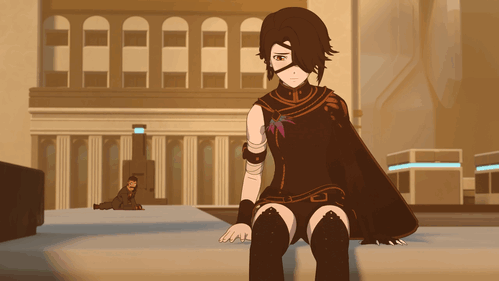
Secondly, there is a difference between the framing of Cinder and several other characters. If we want to consider a character who will get worse and worse and will not change, consider Tyrian, who has absolutely nothing sympathetic about him. Or Adam, who was not very well done. But like Cinder, Adam was a victim who became a villain; the difference was that he was never framed as the protagonist of a separate arc like Cinder has been.
But most important in terms of a framing comparison to Cinder is Salem. At first, it looks like Cinder is the big bad, but after season 3, we realize it is Salem. Cinder is working for her, not as a lackey, but also as a victim. Cinder is deferential to Salem and is not nearly as in control as she appears. Salem cursing Cinder with a Grimm arm--a clear parallel to what Salem did to Summer Rose and wants to do to Ruby--is textbook abuse, and also parallels Cinder with characters we love.
2) Cinder’s Backstory and Tone
Volume 8 finally revealed Cinder’s backstory in one of RWBY’s most brilliant spins on a fairy tale reference, and one of its best episodes ever in “Midnight.” It is cruel and heartbreaking and yes, tragic.
I’ve talked before about how RWBY does, in fact, include tragedy. It has since its beginning and it almost certainly will up to its ending. What RWBY does not do, however, is pessimistic nihilism. Fairy tales and pessimistic grimdark nihilism could not be more opposed. There is always hope.
Showing that Cinder, who was abused her entire life, just ends up "put down” as the worthless person everyone in her childhood thought she was, ends up dead because nobody helped her, ends up dead because she fell out of one abusive relationship into another... that is so not hopeful. That is tonally pessimistic, nihilistic, dark as hell.
Cinder’s breakdown during her “arc” as a villain protagonist shows how lowly she really feels about herself. It does not seem like a fitting narrative choice to affirm that.
3) Themes!
Cinder believes her goal is to become a servant of Salem and a villain. She believes no one will ever show her empathy. People have dehumanized her, so she dehumanizes. Generally, you should prove your villains and their worldviews wrong.

Not only that, but a major theme of RWBY’s is breaking the cycle of abuse. Now, let’s look at this two ways: Cinder as a victim of the cycle of abuse, and a perpetrator. She’s a victim of the madam’s, and of Salem’s. She is drowning in it. But she also abuses Emerald and Mercury by taking vulnerable children and exploiting their trauma to get them to do something to her. The difference is that Emerald has broken away for better and Mercury--well, he’s currently fallen into worser abuse with Tyrian (the subtext of how Tyrian treats Mercury is not subtle and is not good), but Merc also has no respect for the man and is less psychologically trapped than, say, Cinder is with Salem. If Mercury gets a better offer, he’d probably take it. Cinder is both Emerald and Mercury, as @aspoonofsugar has written: she’s psychologically dependent on her abuser (Salem), yet also continuing to spiral by tumbling into worser and worser abusive circumstances.
We know Salem cannot be killed and that thus, the way to defeat Salem is not through violence. Why would it work to have Cinder be put down by either our heroes or her abuser? How will that open Salem’s eyes, considering Salem has constantly put down those loyal to her (like her own children)? How would Cinder not breaking free reinforce the themes? You may cite Ironwood as an example of tragedy wherein a character becomes the worst version of themselves, but there are very different circumstances here: Ironwood’s tragedy is centered on the theme of fear vs. risk, not the cycle of abuse as Cinder’s is. Not only that, but Ironwood starts the series as a hero, and it’s that he is so capable of good that makes his tragedy resonate. Cinder has never been a hero, and her dying as a villain would not have any thematic impact.
So that’s why I think Cinder is set up for some kind of redemption. The reasons I’m skeptical of her survival are as follows:
1) Set-up
There is no “save the cat” moment for Cinder. Mercury and Emerald both have those moments; Cinder does not. Not only this, but Cinder dramatically rejects every opportunity to “save the cat” she’s given. Watts tries to get through to her, Neo teams up with her, and she stabs both in the back and murders (or attempts to murder in Neo’s case) them. That’s not good. She learned the opposite lesson of the one she should learn, and choices can and do matter.

2) Coding/Framing
Cinder is adult-coded, not child-coded like our main cast (and like Emerald and Mercury). She perpetuates abuse on Emerald and Mercury and is older than them, even if she is not that much older. They clearly depend on her, with Emerald clearly looking up to her as an authority figure and Mercury revealing he once did see her as an authority figure when he tells her off.
But wait, you say, you just said she is revealed as a hurting child! Well, yes. As of Volume 8. There is a huuuuge difference between framing villains as victimized kids by season 2 and 3 (Emerald and Mercury) and framing it that way for the first time in season 8. Of course this is also just opinion, but based on the trajectory of the story (and how most adventure/hero journey stories tend to end the second act of three in utter despair, plus alchemy’s emphasis on the number 12) it seems likely to me that we’re at the very least over halfway through the story. That doesn’t give me a optimism re: her chances to overcome her flaws, be a hero, and survive. Of course, I’d love it if it could be done, but I’m skeptical that’s the intent.
3) Themes/Set up
I’ve talked before about how RWBY is alchemical, and a basic tenet of alchemy is that from death comes life. Killing our heroes doesn’t work, because they are kids and the point is that kids are having to save things because adults failed. A kid dying at the end would cast the entire story as a tragedy, and that doesn’t work.
RWBY is also not anti sacrifice. I do not understand where this take (I see it a lot in fandom) comes from, because it has never been anti sacrifice at all. It shows people mourning those who sacrifice their lives, suffering because they’re grieving, but it doesn’t condemn the sacrificers; it upholds what they did as right. There’s nuance there, but the question of what RWBY thinks of heroic sacrifice really should have been answered with Pyrrha’s statue scene in volume 6. Not to mention Penny, Hazel, and Vine in volume 8.
@aspoonofsugar has spoken about this before, but basically, to sum up an alchemy trope: there is often a major death at the end of a specific phase. Black Death, White Death, Red Death. Sometimes yellow, but that’s usually subsumed into another stage (red or white). I think it’s very obvious Pyrrha is the black death, Penny is the white/yellow (the name of Jaune’s sword--Crocea Mors--which kills Penny literally translates to “yellow death”), and that leaves a red one to happen. Who is associated with red, fire, and rubies? Cinder.
Again, this is just speculation, and far-out at that! We will see. But if she does die, I think it would come after Ruby has saved her from her Grimm arm, and that it would be doing something that, while it costs her her life, saves the entire world.
77 notes
·
View notes
Note
Hello! Feel free not to answer this question if it is in any way too much, but I've been wondering about something concerning the "western" mdzs fandom. Lately, i have seen multiple pieces of fanart that use what is clearly Christian symbolism and sometimes downright iconography in depicting the characters. I'm a european fan, but it still makes me vaguely uneasy. I know that these things are rarely easy to judge. I'm definitely not qualified to do so and was wondering if you have an opinion
Hi there! thank you for your patience and for the interesting question! I’ve been thinking about this since i received this ask because it?? idk, it’s difficult to answer, but it also touches on a a few things that I find really interesting.
the short answer: it’s complicated, and I also don’t know what I feel!
the longer answer:
i think that this question is particularly difficult to answer because of how deeply christianity is tied to the western art and literary canon. so much of what is considered great european art is christian art! If you just take a quick glance at wiki’s page on european art, you can see how inextricable christianity is, and how integral christian iconography has been in the history of european art. If you study western art history, you must study christian imagery and christian canon because it’s just impossible to engage with a lot of the work in a meaningful way without it. that’s just the reality of it.
Christianity, of course, also has a strong presence in european colonial and imperialist history and has been used as a tool of oppression against many peoples and nations, including China. I would be lying if I said I had a good relationship with Christianity--I have always faced it with a deep suspicion because I think it did some very, very real damage, not just to chinese people, but to many cultures and peoples around the world, and that’s not a trauma that can be easily brushed aside or reconciled with.
here is what is also true: my maternal grandmother was devoutly christian. my aunt is devoutly christian. my uncle’s family is devoutly christian. my favorite cousin is devoutly christian. when I attended my cousin’s wedding, he had both a traditional chinese ceremony (tea-serving, bride-fetching, ABSURDLY long reception), and also a christian ceremony in a church. christianity is a really important part of his life, just as it’s important to my uncle’s family, and as it was important to my grandmother. I don’t think it’s my right or place to label them as simply victims of a colonialist past--they’re real people with real agency and choice and beliefs. I think it would be disrespectful to act otherwise.
that doesn’t negate the harm that christianity has done--but it does complicate things. is it inherently a bad thing that they’re christian, due to the political history of the religion and their heritage? that’s... not a question I’m really interested in debating. the fact remains that they are christian, that they are chinese, and that they chose their religion.
so! now here we are with mdzs, a chinese piece of media that is clearly Not christian, but is quickly gaining popularity in euroamerican spaces. people are making fanart! people are making A LOT of fanart! and art is, by nature, intertextual. a lot of the most interesting art (imo) makes deliberate use of that! for example (cyan art nerdery time let’s go), Nikolai Ge’s What is Truth?

I love this painting! it’s notable for its unusual depiction of christ: shabby, unkempt, slouched, in shadow. if you look for other paintings of this scene, christ is usually dignified, elegant, beautiful, melancholy -- there’s something very humanizing and humbling about this depiction, specifically because of the way it contrasts the standard. it’s powerful because we as the audience are expected to be familiar with the iconography of this scene, the story behind it, and its place in the christian canon.
you can make similar comments about Gentileschi’s Judith vs Caravaggio’s, or Manet’s Olympia vs Ingres’ Grande Odalisque -- all of these paintings exist in relation to one another and also to the larger canon (i’m simplifying: you can’t just compare one to another directly in isolation etc etc.) Gauguin’s Jacob Wrestling the Angel is also especially interesting because of how its portrayal of its content contrasts to its predecessors!
or! because i’m really In It now, one of my favorite paintings in the world, Joan of Arc by Bastien-Lepage:
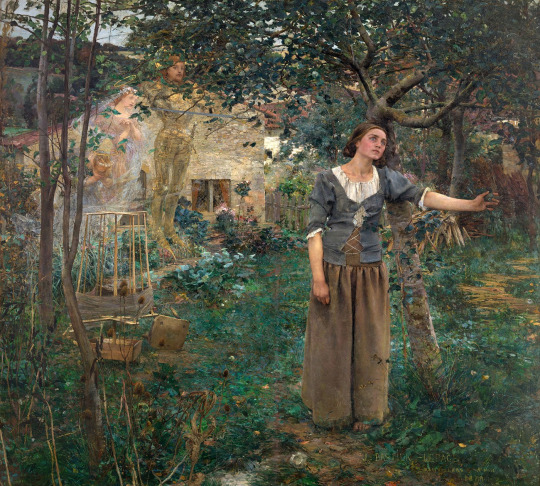
I just!!! gosh, idk, what’s most interesting to me in this painting is the way it seems to hover between movements: the hyperrealistic, neoclassical-esque take on the figure, but the impressionistic brushstrokes of the background AAA gosh i love it so much. it’s really beautiful if you ever get a chance to see it in person at the Met. i’m putting this here both because i personally just really like it and also as an example of how intertextuality isn’t just about content, but also about visual elements.
anyways, sorry most of this is 19thc, that was what i studied the most lol.
(a final note: if you want to read about a really interesting painting that sits in the midst of just a Lot of different works, check out the wiki page on Géricault’s Raft of the Medusa, specifically under “Interpretation and Legacy”)
this is all a really long-winded way of getting to this point: if you want to make allusory fanart of mdzs with regards to western art canon, you kind of have to go out of your way to avoid christian imagery/iconography, especially when that’s the lens through which a lot of really intensely emotional art was created. many of my favorite paintings are christian: Vrubel’s Demon, Seated, Perov’s Christ in the Garden of Gethsemane, Ge’s Conscience, Judas, Bastien-Lepage’s Joan of Arc, as shown above. that’s not to say there ISN’T plenty of non-christian art -- but christian art is very prominent and impossible to ignore.
so here are a few pieces of fanwork that I’ve seen that are very clearly making allusions to christian imagery:
1. this beautiful pietà nielan by tinynarwhals on twitter
2. a lovely jiang yanli as our lady of tears by @satuwilhelmiina
3. my second gif in this set here, which I will also show below:
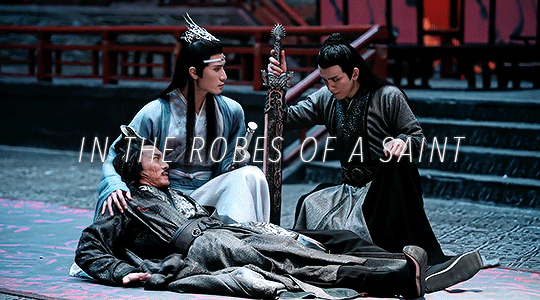
i’m only going to talk about mine in depth because well, i know exactly what i was thinking when I put this gif together while I can’t speak for anyone else.
first: the two lines of the song that I wanted to use for lan xichen were “baby, I’m a fighter//in the robes of a saint” because i felt that they fit him very well. of course, just the word “saint” evokes catholicism, even if it’s become so entwined in the english language that it’s taken on a secular meaning as well.
second: when I saw this scene, my immediate thought was just “PIETÀ!!” because LOOK at that composition! lan xichen’s lap! nie mingjue lying perpendicular to it! the light blue/white/silver of lan xichen in contrast to the darker robes of both nie mingjue and meng yao! not just that, but the very cool triangular structure of the image is intensely striking, and Yes, i Do love that it simultaneously ALSO evokes deposition of christ vibes. (baxia as the cross.... god..... is that not the Tightest Shit) does this make meng yao joseph of arimathea? does it make him john the evangelist? both options are equally interesting, I think when viewed in relation to his roles in the story: as a spy in qishan and as nmj’s deputy. maybe he’s both.
anyways, did I do this intentionally? yes, though a lot of it is happy accident/discovered after the fact since I’m relying on CQL to have provided the image. i wanted to draw attention to all of that by superimposing that line over that image! (to be clear: I didn’t expect it to all come through because like. that’s ridiculous. the layers you’d have to go through to get from “pretty lxc gifset” --> “if we cast nie mingjue as a christ figure, what is the interesting commentary we could do on meng yao by casting him as either joseph of arimathea or john the evangelist” are like. ok ur gonna need to work a little harder than slapping a song lyric over an image to achieve an effect like that.)
the point of this is: yes, it’s intentionally christian, yes I did this, yes I am casting these very much non-christian characters into christian roles for this specific visual work -- is this okay?
I obviously thought it was because I made it. but would I feel the same about a work that was written doing something similar? probably not. I think that would make me quite uncomfortable in most situations. but there’s something about visual art that makes it slightly different that I have trouble articulating -- something about how the visual often seeks to illustrate parallels or ideas, whereas writing characters as a different religion can fundamentally change who those characters are, the world they inhabit, etc. in a more... invasive?? way. that’s still not quite right, but I genuinely am not sure how to explain what i mean! I hope the general idea comes across. ><
something else to think about is like, what are pieces I find acceptable and why?
what makes the pieces above that reference christian imagery different than this stunning nieyao piece by @cyandemise after klimt’s kiss? (warnings for like, dead bodies and vague body horror) like i ADORE this piece (PLEASE click for fullview it’s worth it for the quality). it’s incredibly beautiful and evocative and very obviously references a piece of european art. I have no problem with it. why? because it isn’t explicitly christian? it’s still deeply entrenched in western canon. klimt certainly made other pieces that were explicit christian references.
another piece I’d like to invite you all to consider is this incredible naruto fanart of sakura and ino beheading sasuke after caravaggio’s judith. (warnings for beheading, blood, etc. you know.) i also adore this piece! i think it’s very good both technically and conceptually. the reference that it makes has a real power when viewed in relation to the roles of the characters in their original story -- seeing the women that sasuke fucked over and treated so disrespectfully collaborating in his demise Says Something. this is also!! an explicitly christian reference made with non-christian japanese characters. is this okay? does it evoke the same discomfort as seeing mdzs characters being drawn with christian iconography? why or why not?
the point is, I don’t think there’s a neat answer, but I do think there are a lot of interesting issues surrounding cultural erasure/hegemony that are raised by this question. i don’t think there are easy resolutions to any of them either, but I think that it’s a good opportunity to reexamine our own discomfort and try and see where it comes from. all emotions are valid but not all are justified etc. so I try to ask, is it fair? do i apply my criticisms and standards equally? why or why not? does it do real harm, or do i just not like it? what makes one work okay and another not?
i’ve felt that there’s a real danger with the kind of like, deep moral scrutiny of recent years in quashing interesting work in the name of fear. this morality tends to be expressed in black and white, good and bad dichotomies that i really do think stymies meaningful conversation and progress. you’ll often see angry takes that boil down to things like, “POC good, queer people good, white people bad, christianity bad” etc. without a serious critical examination of the actual issues at hand. I feel that these are extraordinarily harmful simplifications that can lead to an increased insularity that isn’t necessarily good for anyone. there’s a fine line between asking people to stay in their lane and cultural gatekeeping sometimes, and I think that it’s something we should be mindful of when we’re engaging in conversations about cultural erasure, appropriation etc.
PERHAPS IT IS OBVIOUS that I have no idea where that line falls LMAO since after all that rambling I have given you basically nothing. but! I hope that you found it interesting at least, and that it gives you a bit more material to think on while you figure out where you stand ahaha.
was this just an excuse to show off cool (fan)art i like? maybe ¯\_(ツ)_/¯
(ko-fi)
#Anonymous#asks and replies#art#fanart#art history#christianity#mdzs#mdzs meta#meta#mine#mymeta#cyan gets too deep in the weeds#lmfao this post is a mess ive been staring at it for like a week and at this point im just gonna post it to the wall and keep moving asldfj#hope you enjoyed
317 notes
·
View notes
Text

Darkstalker : Great potential, shit execution
Aka me rambling about our favorite genocidal theater kid.
-----
The opinion on Darkstalker in the fandom has a tendency to be very polarized : one side sees him as a redeemable character that is placed as a victim in the story, and the other as complete villain who is completely unjustified in his actions and should have died.
I think (and far from me to imply I'm the only one, I've seen a few other take note of it) that both are facets of the character, and not entirely true or false. Darkstalker is an extremely complex character that is both thematically rich, representing the madness of animus dragons and magic itself, and the feud between nightwings and icewings, that can be interpreted as somewhat dragon racism in general if widened a bit, as well as complex to portray due to his history of both being abuser and abused.
And, since Tui is both a child book writer, and quite frankly not very good at handling more deep themes in realistic ways (especially when her characters are grounded in real people), it was,, quite frankly botched.
A character I tend to compare him to is Bane, the albinos rat that is the main antagonist of Chronicles of the Underland. That book serie has a few things i could comment on, but overall, it handles a lot better a lot of darker themes, including a villain that is "destined to greatness" and abused. Both Darkstalker and Bane are born to a bad father that abuses them. Both are given an opportunity to do better, but continue to spiral out of control, with in Bane's case an extra layer of manipulation. Both end up as tyrannical leaders of a group that wants to commit genocide on another, although Bane goes further and the books are a lot more explicit about his acts. However, where Bane explicitly ends as a villain, and is killed, the fate of Darkstalker is to be reborn, "rebooted", which I personally found extremely unsatisfying.
I'd say Bane is a good character. Although his abuse is a massive part contributing to who he is, it is not an excuse, as there is a very clear limit after which you cannot excuse his actions, no matter how misguided. This limit is more grey in Wings of Fire, as actions tend to have a lot less consequences, and deaths tend to almost be meaningless.
I think his character is portrayed in the two ways the fandom sees him as in the books, hence the clashing. And i think sticking to one or the other narrative would have made a lot more sense.
I usually stick to the true antagonist route : the whole of arc two has an underlaying theme of using magic to transform other as being extremely bad (which makes Darkstalker's fate all the more puzzling), and he's the antagonist that is almost represented by this action, in the murder of arctic, and his manipulation of... Pretty much everyone.
His abuse can be present without his portrayal being insensitive toward abuse recovery : wings of fire is chokeful of abused kids, and one can very much be used as his reflection. In fact, it's interesting to see how the arc 2 character parallel the ones of Darkstalker's time. Moonwatcher is treated somewhat like Clearsight, Turtle is directly compared to Fathom, and both Qibli and Winter have parallels to Darkstalker (and none of the two became murderous like him, although you could argue it is because of the lack of animus power as an option to do so).
I'd have enjoyed this being explored further in the books : I'm not sure what good end Darkstalker could meet, but it at least would serve as a very good way to be directly confronted to his own choices. Especially winter, who is so similar to him while being the very tribe he despises.
He could realize that his choices were his own, and after a time not "forced" by any hand, or deny it. I think portraying all of his actions as things to be forgiven because he is hurt to be extremely dangerous : after all, he does transform a young dragon into his dead girlfriend, which is,,, gross, especially since it's a mind controlled version of her that basically obeys him, manipulates everyone into liking him (this one is *not* the worst, but adding up the rest is,,, ehhh), as well as provoke a genocidal plague upon a whole tribe. Even on a one on one level, he is manipulative toward Moonwatcher and Clearsight, and tries to get anemone, a child, to murder her whole family, which... You can't really justify by having a bad dad.
If he was to be redeemed, it should be before these actions in the modern WOF era, and with a heavy side of introspection on his actions toward Clearsight and Moonwatcher.
I enjoy the idea that didn't go through being that Clearsight would be revived. Her being the one to bring darkstalker down, to finish the job, feels right. She could have matured, with her life being spent with ppl who were not abusive toward her. She could have reflected on Darkstalker, offer him another chance, but take it back if he does not change. I don't like the fact it's basically tui's self insert from what I understood, and i don't have a vision of her as this perfect person, but being the one closest to Darkstalker, she also is the one with the most even field, especially if she is born again from his magic, which could have some implications of bypassing his other spell, mostly bullshit to justify how she could be able to harm him.
Hope, too, could have been the one to bring him down, in the way Yellowfang brings down her child, brokenstar (yet another exemple of this sort of character).
Finally, Moonwatcher, Winter and Qibli as a trio could be very good as the ones to take down Darkstalker, with the help of kinka and turtle. I like the idea of each being able to break at a part of him, with turtle being the one that handles the whole magic part.
That's it for now, disjointed ramble over.
41 notes
·
View notes
Text
Theory: why is Seth Twiright the demon of wrath? What's his backstory?
Note: this theory tries its best to be as objective as possible in explaining and deducing facts basing on only what is known in the novels and not basing on personal preferences and sensibilities, just cold gathering of the facts and trying to draw plausible conclusion. That doesn't mean i'm right, necessarily.
Index:
1) Demon of wrath or demon of pride? (Biblical references and discordance of themes).
2) Was Seth a victim of abuse? (Can we draw this conclusion basing only on what we know?)
3) That one comic by Ichika
4) Conclusion
Chapter 1: demon of wrath or demon of pride?
Seth is a really peculiar character: the sin he's represented by doesn't seem to be...displaying that much, contrary to those of the other demons in this series.
Gilles is clearly lustful (basing on the catholic religion definition of it, at least) seen his high sex drive.
Vlad is not really explained but he's a cook so he must be obsessed with food (joke), also his interactions with Banica seem to suggest a morbid curiosity of his to try new foods for hedonistic pleasure, no matter if it's immoral and illegal to eat those.
Marie Annette is a really prideful human/demon seen her few lines in the entire series, like "bow down to me" without any legitimate reason.
Eve...well...on another theory about that...
Rahab is clearly envious when also other people get what she has, seen that she's basically the ec version of Ayano Aishi and a big stereotypical yandere, at least in one part of the narrative.
Salem (does he even exist? (joke)) is an economist so he must be obsessed with money and gathering earthly and perishing goods. (joke)
I won't talk about Adam Moonlit as the demon of greed here as it's for another topic.
But Seth? When in the series does he show unrighteous wrath? Do we see him get angry outbursts and go around beating up and killing people because he's angry at them?
No.
On the contrary, in the whole series Seth seems to be pretty calculating and cold, and he doesn't seem to be really excessively troubled by any behavior or at least he doesn't really show a strong vengeful attitude towards them.
Yes, he might get on bad mood when his plans don't succeed as he expected to, but he never goes like "you'll pay for ruining my plan" or something. He proceeds with his plans, trying to adjust the latters in order to fit the new situation.
Actually, sometimes he seems to find amusing and funny when people try to kill him and unmask (pun or not lol) him for his evil bahaviour, like when Adam tried to kill him and the latter was surprised he couldn't succeed since Seth outsmarted him, or Gammon when he confronted him about brainwashing Miroku.
It's as if Seth finds funny when people are frustrated because of him, it soothes his ever-roaring mind and boredom.
For months, i've thought that Seth should have been the demon of pride because of his attitude in the crime novel and because it fit him better as for the Biblical references:
We see multiple instances in the crime novel that Seth likes himself very much: he loves the fact that he consideres himself to be the best scientist in the country™ as he uses this bunch of words everytime he introduces himself (both as Horus and as himself), also he considers himself to be very handsome to the point he doesn't want to change his face because it would be "such a terrible crime" (i mean, i also think he's hot but Seth, calm down, what the hell...).
But his pride doesn't end with him flaunting his intelligence and hotness.
There are also other instances of Seth's pride that are even more remarkable.
Like for example, the whole matter of Seth making artificial humans (so called "ghoul children") mimicking the creation of the "gods" in the series. This can be considered a matter of pride, as he wants to act as the "gods", he thinks he's able to be on par of them.
Well lol, gods...i always found pretty unrealistic how we got from human scientists with high tech from almost omnipotent beings that can cast lightening wherever they want, make ladies pregnant and instill thoughts and visions in people in a single arc while being trapped inside of a spaceship. This always provoked some strong cognitive dissonance within me, this sounds like a stretched, inappropriate and unrealistic even if they have big tech. That's why i call them "gods wannabe". They're still humans playing God after all.
But that's besides the point.
Even more remarkable is this other line, right after quoting the achievements of other "gods" in the series:
"In that case—
I am the god who creates “evil”.
Seth is literally and explicitly placing himself in the place of the gods, considering himself to be a god on par of the pillar ones in the series.
And this is very coherent basing on the fact he should be the parallel of the Biblical serpent, the demon who thought he was on par of God and fell because of pride.
So it would have had much more sense to have Seth as the demon of pride.
So when and why is seth the demon of wrath since in the series it looks more like he's the demon of pride?
His motive? Not really...Seth doesn't seem to act because of some sort of anger as his main motivation is to "follow his h.e.r.s nature and make himself 'new friends' (his own definition of friends)".
Then i think we have no choice than look at his backstory and see if we can spot some unrighteous anger there.
Chapter 2: is Seth a victim of abuse and angry at his mother?
The vast majority of the theories around about the reasons of Seth's evil are based off the fact that Seth might have gone through motherly abuse that provoked him some childhood traumas back when he was a little white and red mask.
Those assertions are usually backed up by pieces of the short story "Outlaw and lychgate".
Let's look at them.
The most quoted line about this issue is:
“My, and what sort of dish is that?”
“It’s not really much of a dish. You just splash some curry powder and ketchup on a sausage. My old ma used to make it for me a lot when I was a child.”
“Just like mom used to make, hm. That sounds quite nice. My mother never did any home cooking for me.“
Well...from this particular line, fans have begun to speculate than maybe his mother starved him or refused to cook for him.
But is it necessarily the case? It can be a possible interpretation but we don't know how masks work in this series or whether or not they need to eat, especially since they don't have a mouth or a digestive system of some sort.
It can also be that Seth was just curious about food in the line upwards since as a mask maybe he could not experience food, given that he couldn't physically eat when he was a mask.
This doesn't necessarily refer to an abusive situation of a mother refusing to provide food and care for her son.
There is also another instance in which Seth spoke about his mother.
"I often hear strangers tell me that they can’t tell what I’m thinking.
Even my own mother said so, before she died.
That’s why, to get her to understand at least a little bit, I shot her in the forehead.
To this day I still remember how stopped moving, her mask cracked in two.
That was the first murder I committed."
Ok, the fact that his mother "didn't understand him" could have been because of various reasons:
1) maybe she didn't try to understand him and neglected him.
2) maybe Seth became too different from his mother since he contracted hers and she couldn't understand and relate to him anymore even if she tried to.
3) Seth is just too cryptic or changes his mind too fast (probably because of his boredom) when it comes to expressing his true intentions or having certain intentions therefore people have big trouble understand him.
I would go for 3 since Seth also explained that not only his mother didn't understand him but also various other characters, so it's not necessarily true that Seth's mother just refused to listen and understand him, it could have been that Seth was too cryptic or that she couldn't relate to a her.
Anyways, we don't have a lot of info about this but i don't think it is correct to see a mysterious passage in just one possible way.
And also i wouldn't like for Seth to be "he's evil because mommy wasn't nice therefore he's angry and wants to make everyone like him and destroy everything uwu" because:
1) that's a really misused trope.
2) it doesn't properly explain why Seth did what he did in the crime novel, it's clear that there has to be an even deeper motivation that made him do those horrific things: abuse is too much of a simplistic and lazy motivation given his role.
Also there is no specific mention of anger and resentment even if there could be.
So where can we see that Seth is angry?
Chapter 3: that one Ichika comic.
Let's look at this one comic.
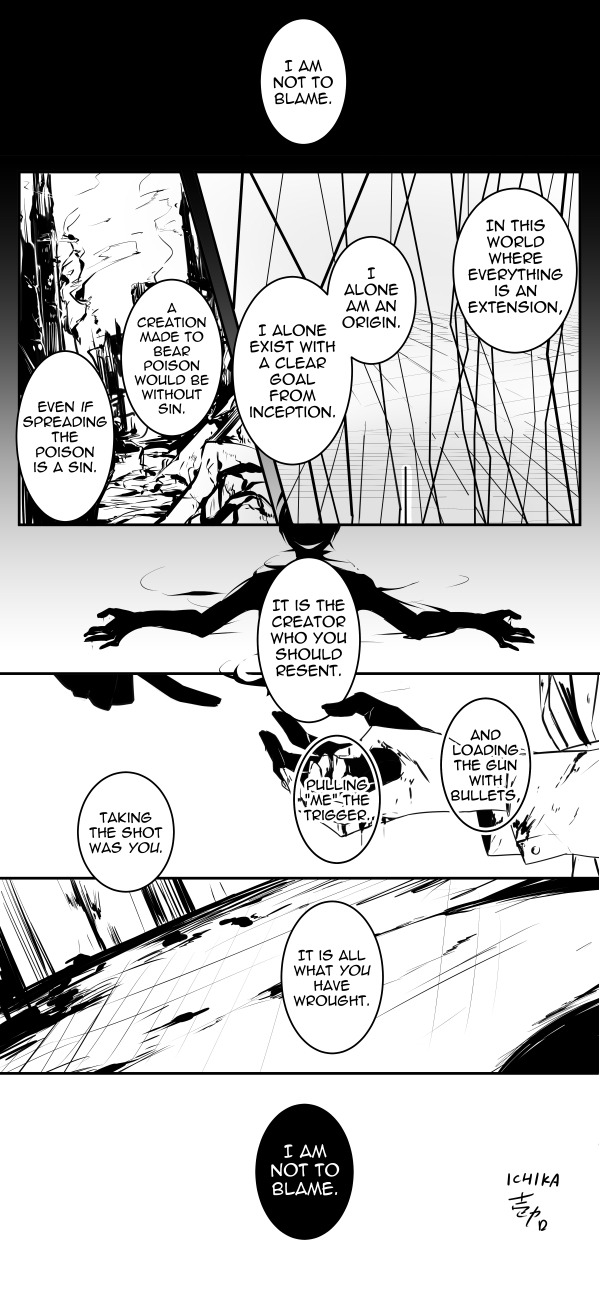
It is kinda difficult to understand what it means but the face resembles Seth's human form a bit and also this comic shows a theme of anger against the human creators of the first period since the comic seems to be talking about the second one "in this world where everything is an extension" (the second period is a virtual parallel reality to the first one in the series).
Seth seems to be pretty aware of the first period.
I think so because Kiril (his clone) at one point gained back the memories of his original.
Who? Seth? Pale? (That twist complicated things a whole lot).
I will go for Seth since in the series he's always referred to as the original talking about his "clones".
Kiril with Seth's memories came up with "Vocaloid, huh?!", showing awareness of the knowledge of vocaloid (since the first period is similar to the real world in the series) but i don't think this is an info Kiril learnt on his own but he took from Seth's memories since he was a researcher of parallel worlds and wouldn't have been out of place for Seth to learn about the first period.
So, given that Seth is the one of the comic and he's talking about the humans of the first period, he seems to be angry at the fact he was born to be an her (let's remember the humans of the first period started the her problem for their own personal gain) and in the society of the second period he's seen as a problem because of that.
Therefore Seth in his anger invites people to blame the creators instead of him since he doesn't think to have a free will and has no other choice than being evil because of those humans who "made him this way".
Funny how the same topic is faced with Irina and Levia in the duel. And funny how Levia in this series seems to also be a victim of her own pulsions and can't really be a moral authority in this, again, gods wannabe. They have their morals inspired by their originals who made their avatars who have tainted them with a virus, so they can't create, define or judge good and evil themselves.
So funny.
Chapter 4: conclusions.
So i think this is a plausible reason Seth might be the demon of wrath. But still, i wonder how it is that Seth is happy later on to follow those pulsions he thinks he can't control (given by humans) and doesn't try to fight back the instincts.
Maybe he accepted and got happy with his disease or he just resigned that that was his destiny thinking that he had no choice.
I don't know if i will make anymore theories after this, since i want to go on and make content for something else.
30 notes
·
View notes
Text
Wonder Egg Priority finale thoughts
My Tumblr has a lot of anti-bully content, so it was probably no surprise when I began to watch and enjoy Wonder Egg Project this past spring. The series famously hit production delays that forced them to put out a mid-series recap episode, and that decision in turn forced them to push the final episode until late June. But now that the series (or at least season 1) is out there and complete, I thought I’d talk about how it all shook out in the end as well as the questions it left me sitting with.
For the uninitiated, here’s a bit of the context: Wonder Egg Project deals with four middle-school teen girls who’ve undergone hardships either at home or at school or both. They all lose someone they care about to tragic suicides, and then they discover the titular wonder eggs. They get these eggs from a vending machine and then, when they fall asleep, they enter a dreamworld where these eggs hatch to reveal a young person who recently committed suicide. For that night, it is the duty of the girl who got that egg to fight and defend that suicide victim from monstrous enemies that represent their abusers and oppressors. The girls are told that if they protect enough of these victims over many nights, they will be able to resurrect the specific person they lost to suicide. But of course, if you get injured or killed in the dreamworld, it affects your body in reality as well.
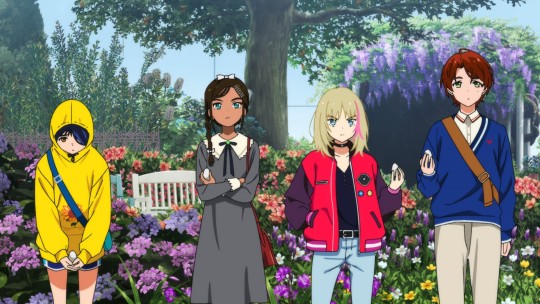
The squad: Ai, Neiru, Rika, and Momoe.
Obviously, bullying is among the topics most frequently explored here, but we also deal with so many other terrible things that people might experience during childhood and adolescence. Physical, verbal, and sexual abuse are all on the table. Coming to terms with one’s gender identity is raised. It’s a show that manages to tackle a lot of heavy subjects through the lens of what’s essentially magical girl combat. I mean, there are no outfit transformations or any of that stuff, but still.
With THAT out of the way, let me talk about how the series wrapped up.
It’s clear to the viewers that there’s a lot that doesn’t make sense during the show — it’s intentionally very trippy and ethereal at times — and there’s also a lot that raises obvious questions even if you grasp it. Where do the eggs and their connection to the recently deceased come from? How do the psychological traumas of the various egg-children manifest as monsters that can literally kill you? What’s the deal with Acca and Ura-Acca and their freaky dummy bodies? What are they getting out of this whole deal with the eggs and the girls? What do the repeated references to the “temptation of death” mean? How does access to the Egg Garden even work? Is it really possible to resurrect their dead friends? Is Mr. Sawaki a predator or a chill guy or what? Why did Neiru’s sister stab her? And so on.
The writers could’ve opted to keep things mysterious and hazy and metaphysical for the entire run or they could’ve provided lots of explanations and tried to ground this weird story in some sort of strange logic, but I’m actually pleased that they opted to go down the middle. There are answers for many things, but not for all. And when those answers come, they typically just raise more questions as well as doubts to their validity.
SPOILERS for the finale/”special episode” below the cut.
So, obviously the answers for Acca and Ura-Acca are centered around Frill. Frill is this interesting fusion between the artificial and the organic; her body can be injured like any regular physical body, but she’s actually an A.I. on the inside. Acca and Ura-Acca are the exact reverse of this — they’re human minds inside of completely artificial bodies. Exactly how Frill started invading girls’ minds to lure them towards suicide is kept incredibly vague, but she serves as the embodiment of the “temptation of death” that was so-often referenced in the show. Frill doesn’t really appreciate life or care about the finality of death, making her a pretty natural foe for the heroes who have spent the entire series learning to appreciate their lives and bemoaning painful losses.
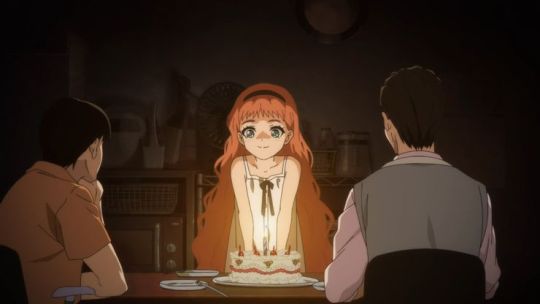
Can you even believe this bitch?
Acca and Ura-Acca also have documents talking about how warriors of Eros need to battle against Thanatos, the embodiment of death, but what’s that all about? We don’t really get into it. Is Frill somehow Thanatos herself? I mean... I guess maybe you could go that route, but I sincerely don’t think that’s meant to be the case. I assume she’s just another player in the game, and she happens to have taken Thanatos’ side in things. Her artificial existence and resentment of her fathers leads her to treat death flippantly. She was programmed to be selfish sometimes, and that selfishness has ultimately manifested itself in the worst possible ways. Intriguingly, we see Acca and Ura-Acca act similarly selfish in how they drive our four heroes to risk their lives just to battle Frill. Acca in particular shows that he’ll risk anyone’s life to get to Frill, who killed both his wife and daughter. But Acca never has to risk his own life. He’s just risking other people. Both sides of the equation are treating human lives like disposable pawns in some kind of war game.
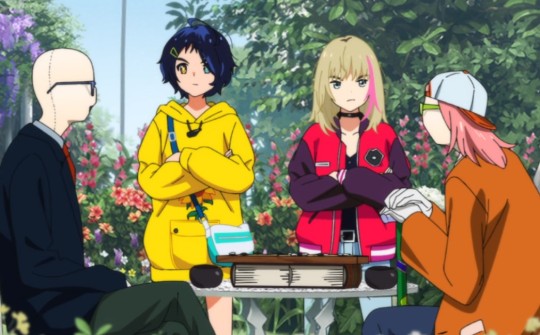
Y’all are SUPER-SKETCH.
It’s never really clear how these eggs work. We’re told that the Accas created the eggs, and honestly, I could’ve figured as much on my own. But they don’t try to explain how the eggs can contain the souls of suicide victims or how they manifest those people into dreams, and frankly, it’s probably better not to try.
I was really shocked that the girls actually manage to resurrect their dead friends. I was 100% certain that was going to be a scam and the point was going to be about learning to move on and live for the moment and appreciate those bonds while you had them, etc. And there is some of that. Alas, the price of resurrecting those people they care about is that the people in question no longer know them or remember them. That was pretty brutal... having our heroes nearly die over and over in service of people who ultimately will no longer care about them at all. Although they did the impossible and brought someone back to life, they had to lose those people all over again. I suppose this, like much fo the finale, emphasizes that we should appreciate our relationships while they last, because you can lose them for so many reasons. Regardless, I’m not surprised that Momoe just wanted to quit and avoid getting hurt after that. It’s understandable.
There’s a lot of discussion around parallels in the last two episodes. Parallel worlds with alternate versions of the self are raised multiple times, Ai gets an awesome encounter with a parallel version of herself that really brought her emotional journey to a head, and we even have to deal with a doppleganger of Neiru at the end. This leads to the revelation that Neiru looks exactly like her formerly deceased sister... a fact that presumably was part of what drove the sister to attack Neiru in the first place. Given that we’ve already been told that they were both genetically engineered, their identical appearances don’ seem that strange. But then the finale tells us that Neiru’s one dream is “to be human,” and suddenly the characters assume Neiru was an A.I. just like Frill. That... seems like a leap to me. I mean, she was genetically engineered to lead her company and never had a family of her own; no wonder she feels inhuman! So I’m not sure if I should take this at face value.
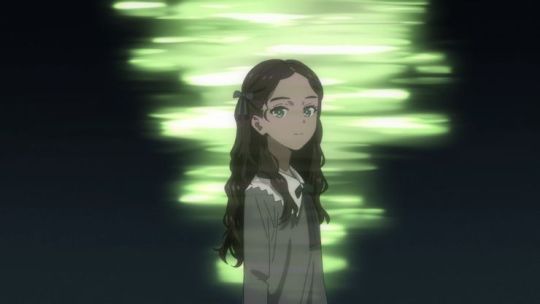
Neiru real or fake challenge
Another thing that I don’t think we can take at face value is Mr. Sawaki’s explanation of Koito’s death. In episode 12, we meet a parallel version of Ai who actually killed herself. The big boss monster for Ai to fight while protecting Alt-Ai? It’s a dark, abusive version of Sawaki. And our Ai inexplicably assumes this monster was made from her own fears. A very bizarre conclusion to jump to when you remember that every single boss monster has been the abuser of the victim that the girls were defending in that episode. By all available evidence, the Sawaki monster should be a parallel-world Sawaki who is very much exactly the scumbag he appears to be! Notice how Alt-Ai never says a damn word about the Sawaki Monster - never asks who he is or why he’s like this, etc? She’s not even surprised. That just lends further credence to my belief. FOLLOW THE EVIDENCE.
So in the finale, when our version of Mr. Sawaki claims (via a VERY awkwardly inserted voiceover) that Koito’s death was an accident after she tried to ruin his reputation because she fell in love with him, why should I believe any of it?! The previous episode introduced me to Abusive Sawaki! Sure, we don’t have any reason to assume our Sawaki is That Dick, but we JUST learned that he’s certainly capable. Furthermore, how could Koito suddenly be the ONLY accidental death among all of the available suicide victims in the dreamworld? She shouldn’t have even appeared there if it was just an accident! Although I’d like to believe that Sawaki was someone who Ai and the girls were jumping to conclusions about based on nothing... but it sure doesn’t look that way from here. And given how the show ends things, I fear we may have a hard time learning anything else about Sawaki. Ai changes schools and runs away, there is zero comment on what happened to Sawaki’s relationship with her mom... he’s just gone now.
As the final episode winds down, we see Rika and Ai fall back into bad habits, as they all treat Neiru just like they treated the girls they tried so hard to save. Rika acts disgusted by a friend and abandons her, treating Neiru the same way she treated Cheimi. When Neiru finally reaches out to Ai and calls her, Ai ignores the call and throws her phone away, thereby ignoring her friend’s needs in the same way she ignored Koito’s when she failed to record the bullying Koito was experiencing. You might even be able to connect Momoe’s choice to walk away for the sake of self-preservation to her decision to reject Haruka and walk away, honestly. And to compound the bad news that the show gives us near the end, we skip forward months to learn that Ai, Rika and Momoe have all drifted apart. Ai is in a new school, but we don’t see her with any new friends. She’s back where she started the show.
The difference, however, is that she doesn’t seem hopeless and lonely. She seems wistful, sure, but she never seems beaten down. She still treasures the friendships she built even if they wind up fading away. So there’s still a message in here about moving on, because even if you lose a person or a connection, it will forever matter.
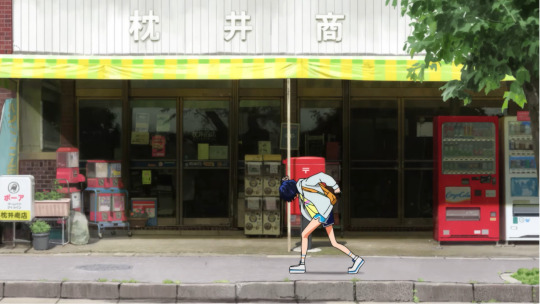
*insert engine rev-up noises*
In the final moments, we see Ai preparing to run in the exact same pose she used back in episode 1 when she first stood up to the abusers within the dreamworld. This time, she runs to grab her chance to reunite with a dear friend. She takes charge of her own future and her own self-worth, somehow gets back into the Egg Garden (even though Rika wasn’t even allowed to enter after she rescued her specified victim, so uh... how did Ai get back in exactly... ?), and insists she’s going to use the eggs to see Neiru... even though the eggs only let you see the dead up to this point, so uh, that doesn’t really make any sense either. Consistency, motherfucker — DO YOU USE IT?
Amidst all the uncertainty that the finale left us with, at least we can see Ai find herself in a more confident place. She spends much of the series learning to stop running from her problems in the real world. Even after she gains confidence in the battles of her dreams, she struggles to face reality. It’s a huge step when she returns to school. Yet even in the very last episode, she opts to run away to a new school rather than cope with seeing Koito each day. But at last, she decides to take charge of her reality and try to reunite with her new best friend, Neiru. She’s wavered on her path, but ultimately, she’s grown. Although you could simultaneously argue that she’s failing to learn the lesson that rescuing Koito should’ve taught her...
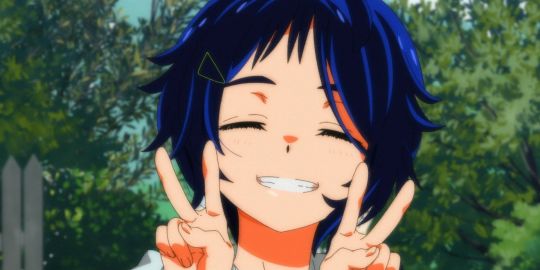
“Ai Ohto is BACK!”
I don’t think any of us expected this finale to be a cliffhanger coming into it. And unfortunately, we don’t know if there will ever be another season or a movie or anything. Given how people reacted to this finale with such overt hate, I really don’t expect anything more. And I think that would be a goddamn shame. Even with a finale that doesn’t quite stick the landing, I still found it fascinating and engaging. The series is more than worth the trip for the characters, for the themes and topics it explores, and even for the fluid action scenes and music. And this is a series that was made by first-time writers and a first-time director! Yet I’d easily call it one of the best animes from the past couple of years. For total newcomers, that’s a goddamn TRIUMPH.
So I hope we reunite with these girls again. I hope Ai manages to get the band back together, find out exactly what’s going on with Neiru, and face down Frill. Even if they never wind up in some ultimate battle with Thanatos, I don’t know that that’s the point. All of us are in a battle with Thanatos every single day, after all. They just need to show how they’ve all gotten stronger together and truly overcome the “Temptation of Death” by beating back Frill (and her ridiculously powerful dreamworld bug-people) as a unit.
But maybe that’s too obvious and simplistic of a message for a show like this one. Maybe this complex ending centered on the main protagonist’s self-actualization and the value of fleeing relationships is more in keeping with the melancholy nature of the series.
... I still really want to see the more obvious happy ending, though. I think they deserve it.
#wonder egg priority#ai ohto#wep#anime#anime reviews#wonder egg special episode#wonder egg priority special episode#wonder egg priority finale#wonder egg finale#wonder egg
48 notes
·
View notes
Text
A lil rant
After watching this episode a fourth time and certain scenes a lot and thinking about it a lot I wanted to explain further than I did in the last post.
I focused a lot on explaining the consensual aspect of their first time and explaining the motivation behind Armando's actions as well as Betty's, but didn't elaborate much more, for one like I said I'm an insomniac and was out of it lol, try writing a post for nearly twelve hours and tell me you wouldn't either. I do see that I should probably draft a lot of my "analysis" when I write them because I am not all there so I don't explain things as well so I'll start doing that so the post are a lot more consistent and clear as opposed to me starting with one point and never finishing it. Anyway now that this disclaimer is out of the way here are my thoughts on said episodes as a writer.
Many times when writing we have to revisit our work as we are writing it. This allows us to pick up on certain plot holes and mistakes as well as even figure out some plot twist in the future. Often times when you know your characters and the moral and ending of your story, the story ends up writing itself and forming it's own path. I've mentioned in past posts that the first draft is to write with tears and blood and the when that's over you clean up your crime scene.
Now, all writers are imperfect and we make mistakes, duh, so there's inconsistent things in this show, like the dog, Camila, Beatriz Valencia, etc.. etc.. however when it comes to the main character's personality there really isn't much of a flaw, in fact they are very realistic and consistent, the actors did a phenomenal job bringing said characters to life, one of my all time favorite details of the characters in this show is how they all have ticks. Guti Guti does that thing with his lips, Patricia flips her hair, Betty worries her lips a lot and when she is explaining certain things she often has this really adorable thing where she rocks on her feet and speaks very certain of what she's saying. Armando has so many ticks that it's hard to keep up with them. Point is they all have so many realistic behaviors that it's hard not to notice them and even harder to disregard them as not part of the story when they are. They are a huge part of being able to credit or discredit the motives and actions that move these characters.
For that exact reason Betty's character in the past few episodes was so heavily important to understand where she was coming from. It wasn't just that she was drinking that got her all riled up and excited that night. It wasn't just that she missed him days without him made her longing and desire increase ten fold. There is always a cause and effect.
What caused Betty to behave this way? How did that effect her relationship? What caused Armando to react that way? How did that effect their relationship? Most importantly, how did this affect them both?
There's a clear understanding of who Armando is and what his secret desire and motive is to make Betty fall in love with him. Though his pride and ego are so huge he can't see past it to dissect and understand his feelings aside from the prejudice he has against women who are not the status quota, in the mildest of all of that there lays one true objective: Betty's heart. We mustn't forget that Armando IS worried about Eco Moda and most certainly that he never wants to admit that he was wrong.
However much like a future dream demonstrates it, Eco Moda is just a farce for his feelings towards Betty. Though outwardly he is motivated by the desperate desire to be validated and loved by his parents, to be better than Daniel, and not admit that he was wrong, inwardly what really pushes him and makes him go after Betty is his desire for her.
How does this start off? He blurs the line at work, where things no longer are just professional coming from him. He makes certain achievements of Betty's in her profession and even morale his own, as if they were a team facing the challenges together. He inserts himself into Betty's life and he inserts Betty into his personal life a lot. With his affairs, his feelings regarding the company and his worries. He trust her as his confidant, as his best friend. He trust her with his feelings more than he does with his actual best friend and his fiancé and this all starts days before the plan is even a plan to him.
The cause of this? Betty's faithfulness and unconditionality.
The effect? He feels like he is special to Betty, as he said himself he had been so special with her(If you haven't yet I suggest that you read the posts Nicolas Mora, Un Amigo, Betty, My Betty! Parts 1-3).
As their relationship progressed his feelings continued to grow to the point that this night, not after he slept with her but before he did, he fell in love. It was when Betty was being vulnerable and apologizing to him for having been overbearing that he fell in love.
However Betty had already been in love with him, way before. She knew him in and out. She knew the good and the bad. She accepted him as is and all she wanted to do was give him her affection and love and that's what she's done, it's all she's done and this feeds a cycle of desire and motivation for Armando where her love motivates him to change, it inspires him to be a better version of himself to make Betty happy because seeing her happy makes him happy, it challenges him to change his own prejudice of society and people. She is a safe haven and she achieves that, how wasn't he supposed to fall in love with her this night when she does exactly that?
Betty's cause to behave like this was her conversation with Aura Maria days before where she questioned if Armando felt more for her than just admiration. She questioned if he too desired her. The effect of that conversation was her testing to see if Armando did in fact feel the same way, that he was on the same page.
It is also so satisfying to see the parallels! Oh how wonderful they are!
The extreme contrast between Betty and Marcela are so visible, so vivid, so in your face that you cannot say that Marcela is a victim of Betty's.
I won't defend Betty's actions for involving herself with a man that was in a contract with another woman(I say contract because it was not an engagement. What Marcela and Armando had was a contract, he did her the favor of marrying her and she owned him.) I understand that she is insecure but she was always shown to have morals and ethics above all, where did those go? Out the window that's where. However I still love her so imma be a supportive mother to Betty and call her out but lend her my two shoulders to cry on, okay?
Moving on.
Betty did not and I will repeat this BETTY DID NOT MANIPULATE OR FORCE ARMANDO TO SLEEP WITH HER.
We get two contrast of the exact same scenario for that exact reason people.
Betty and Marcela literally ask the exact same questions to Armando: Am I making you uncomfortable? Am I bothering you? Do you not want to be with me?(Marcela asked Do you want me to leave?)
However they ask it with different intentions and motivation.
Marcela never pays attention to Armando's body language. Instead she focuses solely on herself, her feelings, and what she wants, this is not a person who is insecure, this is not a person who has no self-worth. This is a person who has a huge ego. MARCELA IS SELF-CENTERED AND SELFISH TO THE CORE. For this exact reason she refuses to let go of Armando because she believes that she deserves him not as a human being but as a trophy to satisfy herself that she tamed a man who sluts it out left and right.
This night we get to see that.
While Betty asked him these questions to make sure he was on the same page as her, that he too desired her just as she desired him; Marcela asked these questions to trap him. She wanted to be like "Aha! You do have a lover! Now I'm going to make your life a living hell because I was right!"
No sis, calm your tits, you need a therapist.
While Betty was legit asking for it, for Armando to consent, Marcela was asking for him to satisfy her. There is a huge, and I mean huge difference between asking for consent and wanting to be satisfied.
Ironically my current WIP pushed me down a rabbit hole on information that explains the dynamics of a survivor and a romantic relationship and how to be a supportive S.O and a lot of the articles I read mentioned the importance of intimacy.
What is intimacy? It is forming a friendship with your S.O and establishing honesty and respect. It comes above the physical aspect of the relationship because it makes you feel safe when things are leading to something physical.
Marcela and Armando don't have that. Armando has even told Marcela that he doesn't want her to have his intimacy. When I first saw that scene I was like "Take a look at this an*s! Why is she with him?" and then I saw why... Marcela be blabbering his business to everyone. She tells everyone that Armando is unfaithful(I mean in that aspect he do be deserving that) but it goes so much deeper than that. The reason he cheats on her is because he is trying to escape, have control, and feel validated and then that feeds her possessiveness over him, which then feeds his desire to cheat(@el-moscorrofio-y-el-mercachifle already made a meme about that lol). She never does anything to gain his trust, instead she demands it and when she doesn't get it she has this "Aha! It's because you're a cheating whore and I'll destroy the woman but stay with you because you belong to me you puny little man! But I will also ruin you if you leave me!" Their relationship sucks. It's honestly just a moral enemies to sex trope. That's it. Like there's nothing there.
Which is not the case for Betty and Armando.
They in fact do have intimacy. They talk about their feelings, they face trials together, as a team, they push one another and inspire one another. They were friends(a lil more than friends doe) long before. In the scene where they are talking in the hotel room Betty tells him she understand him, that she understands that he doesn't feel that sort of attraction towards her and just because she loves him he isn't obligated to sleep with her.
I want to repeat this in cause people are still confused or saying Betty forced Armando to sleep with her: She said :YOU ARE NOT UNDER THE OBLIGATION TO HAVE RELATIONS WITH ME JUST BECAUSE I WANT TO.
What does that sound like to you?
Imma wait for crickets.
When Armando then tries to engage into relations she pulls away and tells him that he doesn't have to.
She is literally placing his needs, his feelings, before her own, however Armando has just barely fallen in love and he wants to. He wants to sleep with her. He wants to engage in fornication and sinful actions with Betty.
He gets frustrated when Betty tells him that he doesn't have to and we know it's because he hates it when people, especially Betty, invalidate his feelings or efforts. The fact that Betty now was telling him no upset him because he did want to sleep with her, however he did not pressure her either. He explained why he did want to sleep with her and when she consented and he too consented they sinned.
However later that night we get almost the exact same scenario but with a different tone.
Marcela, after they argued, sits by his bed where he is laying down and goes to take off his tie and tells him that she desires him. Armando was laying still he told her he was tired, wanted to wash up and go to sleep before she did this. He did not look nor welcome her actions, which is different from when Betty told him that she wanted to make him feel better. In that scene Armando asked her how she was going to do that and when she said with her kisses, they both leaned in to kiss. This time Armando just lays there, like all the other times before but he looks at her with a cold stare.
When he jumped back from Betty when they were making out, Betty asked him what was wrong and he expressed himself.
However this time when Marcela asks him her tone is different. This time she's angry at him as she yells at him to deny that he has a lover now.
Marcela wasn't looking to be with her man, she was looking for her man to be with her. She wanted him to prove to her that he hadn't been sluting it out(like how was he supposed to prove that when she been knew that he still went and slept with her after he slept with whomever? Like she knew he did that and she still consented? WHAT? which y'know feeds the notion that she just wanted her socks rocked) but it contradicts what she says the next day to Patsy Pats at the office. Marcela just wanted him to satisfy her. She wasn't looking for it to be team work, she was looking for it to be about her.
This is why that night was so important. These little scenes, movements, play on words and parrales are there to show us two different relationships; a healthy one and a toxic one.
Marcela didn't respect Armando's no, she just had no other option because this time he wasn't just laying there letting her do what she wanted, this time her emotional manipulation didn't work, this time her seggsual manipulation doesn't work so unless she was gonna r-word him than she had no other choice but to be pissed about it.
Betty did respect Armando's no. She tried to explain herself and apologize to him. She even double checked with him when he told her he did want to. Betty was willing to not have relations with Armando if he didn't want to, for the sake of their relationship and what they have, she would not jeopardize their relationship just to get her socks rocked nor would she make him feel guilty for it.
It wasn't a happy little accident that we get these parrales in one episode.
Understanding the cause and effect helps us determine this.
Understanding the character's inner desires and dilemas helps us understand this.
So no, once again, Betty did not force Armando to sleep with her. Everything before, during, and after that scene shows us and tells us this.
We get both a cause and effect with the added bonus of show, not tell.
This novela reads like a book, so there isn't much of a speculation when we are being shown to compare both of these relationships when they are saying the same things, in the same scenario but with different tone and reaction from the character of interest in both scenarios.
The purpose of this novela was to break social norms of how certain women and men are presented in the media and to question why that is. It isn't simply a love story, if it was I wouldn't be able to watch it as stuff like that makes me want to puke, again this is all a funny ironic joke that someone is playing on me.
[EDIT:
Another key things to take into account(I mentioned it in the Forgive Me post) is that even Mario's tactic to manipulate Armando had nothing to do with Eco Moda or his ego. It had everything to do with Betty's feelings and Armando's desire to make her happy. That same day Mario took notice of Armando's behavior towards Betty at the office and the guilt he felt over forgetting her B-day. Mario played with Armando's feelings and he pushed his buttons to see just how much it mattered to Armando.
When Armando said at the bar that he couldn't go through with it, Mario told him he was convinced, a sincere reaction of his, and he didn't have to do it anymore. However when Armando said he couldn't do that to Betty because she was really looking forward to it, Armando was smiling when he was talking about her enthusiasm to spend time with him, and Mario took notice of that.
So again, Armando did want to sleep with Betty, he just didn't want to do it under deceit or manipulation. He didn't want to be Betty's "First" under those conditions and Betty didn't force him.
My rant is over.
[EDIT: On the Forgive Me post I went back and did two corrections, they are in bold so if y'all want to read them, that would be awesome :)]
#don armando#armando mendoza#armando ysblf#betty pinzón solano#beatriz pinzón solano#beatriz pinzon solano#betty ysblf#yo soy betty la fea#morch#marcela ysblf#marcela valencia
40 notes
·
View notes
Note
Could I request something with Solomon,Belphie,Satan and Mc? The new story in the event was adorable! ( if that’s too many characters feel free to make any changes, and I don’t really mind whichever scenario <3)
OMG UR SO RIGHT 😭 THE NEW STORY WAS SO FUCKING CUTE I LOVE THIS PROMPT AAAA
twister! (solomon, belphie, satan, & mc)
◦◦,`°.✽✦✽.◦.✽✦✽.°`,◦◦
As it turns out, the Devildom had many of its own versions of food and other amenities in the human world. You weren't particularly surprised by this, but figuring out what was familiar to you and not familiar to you proved to be generally pleasant, in some circumstances unpleasant, but usually just surprising.
What came as the biggest surprise to you was that there was, indeed, a Devildom version of the game Twister. It was actually called Devil’s Twist!, but the rules were practically identical to those of Twister. You found this out when Solomon invited you to play a game of it, along with Satan and Belphie, since they happened to be hanging out in the study together when the old sorcerer brought up his idea. Upon arriving, you learned exactly what your suspicions were telling you; it was basically an exact replica of the Twister that you were so fond of. You had memories playing this game with your human world friends as a child, and you were more than happy to indulge in these nostalgic desires with new friends.
As the four of you were getting set up, even more fond memories, but more recently, ran through your mind as you recalled the creative activities you set up with the Little D clones in this very room to try and burn off their energy. Satisfied with the fun they had had, they disappeared, leaving the four of you equally as satisfied but a bit sad that the bratty yet cute young demons had to disappear so soon. You fondly recalled painting along each other’s feet so you could join in the fun, and you smirked to yourself as you recalled their funny reactions to being painted on; it was no secret that they were all indeed very ticklish.
Then you smirked, hoping that they couldn’t see you; that gave you a perfect idea of how to mess with them in the middle of the game. Hopefully they wouldn’t be too mad; after all, it was you, and your were more than happy to bask in their rather gentle treatment of you.
Since the four of you were the only ones in the house, one of you had to reach over and spin the dial to the best of your ability; Solomon was the first one to volunteer, and to make sure it went smooth, his turn was last.
You were the first one up. Right hand on red was your first order, and you placed it on the corner; you were lucky since the red side was facing you. Next up was Satan, whose left foot had to go on green, and finally Belphie’s was left hand on yellow.
Then, when Solomon spun for his first turn, the spinner landed on left foot on red. He smirked at you before reaching over the whole mat to land his foot on the spot right next to where your hand was.
Oh, so that was how he wanted to play it. Luckily for you, you had a trick up your sleeve, and it seemed likely that he would be your first victim.
Since Solomon was no longer facing the board, Satan decided to give the next spin; left foot on blue. It was your turn. You easily swung your body to the side so you could plant your foot on one of the blue spots, the row being easily accessible since it was so close to the red row where your hand was. Solomon’s leg was now pressing into the side of your shoulder; now, more likely than ever, seemed that the sorcerer would be the easiest first target.
Satan’s next turn was relatively easy: right foot on yellow, and Belphie followed with a right foot on blue. The two demon brothers had made a smart move by deciding to move away from each other; Belphie was easily able to swing his body around Satan’s without colliding with his brother as he planted his foot on the blue dot.
Solomon’s next turn was right hand on red, and this put him at the perfect position for your impending attack. He reached over your body so his chest was leaning against your hip, exposing his entire torso to your left hand that had yet to be placed. Belphie let out an amused snort, and as Satan leaned down to spin for your next turn, he commented, “Getting a bit feisty over there already, huh?”
You and Solomon could only laugh. To your relief, your next move was right foot on red. You positioned your foot next to your left so you were now practically sitting upright, your right hand and two feet both planted on the dots on the mat. As Satan spun for his turn, you figured that this was the perfect time to strike. After all, your left hand was free, and it had yet to be designated a position. Smirking to yourself, you reached up and gave Solomon’s side a bit of a tweak, right where his ribs gave way to the soft fleshy part of his waist.
The sorcerer let out a surprised squeak at the sudden contact, and his body lurched away from your prying fingers. You tried to hold back a snort of amusement at his reaction, and judging by the sudden shuffling, you guessed that the brothers heard (and maybe saw) what was up. “MC, don’t do that, that’s cheating,” Belphie commented, but you could hear the laughter in his voice.
But you didn’t plan to stop there just yet. As Belphie was getting set up for his turn, you struck again, this time really pressing in and squeezing at the soft parts of Solomon’s side. He let out a squeal at the contact, and he began to try and squirm away from you, as best he could without losing his position. But you were pretty merciless; the second your fingers found his underarm, it all came crashing down (literally). The sorcerer fell over on top of you, crushing your hand under his armpit to try and halt the sensation, but you still didn’t stop. You continued to playfully tickle him until he was cackling, rolled up in a ball next to you on top of the mat.
“Okay, okay, that’s enough,” Satan told you both, trying his best to sound annoyed, but you could tell that he was at least somewhat amused. “We’ll start another round now.”
You couldn’t help but giggle to yourself as you stood up, offering to be the spinner for the next round. Solomon glared at you as he took his spot on the opposite side of the mat, keeping his distance from you and your tickly fingers. You smirked at him, raising your eyebrows, and he just rolled his eyes before looking away.
As the four of you progressed through the second round, you found yourself becoming quite closely bound with Satan this time. Except he wasn’t quite literally curled around you like Solomon; he had his right foot on yellow while his other foot was on blue, and his two hands were stretched almost all the way to the other end of the mat, on a green and blue dot. You were at the leg end of him, your hands on red and blue dots, and seeing his leg outstretched like that behind him jogged a piece of your memory; the blonde was ridiculously sensitive on his knees. You were in the perfect position to strike. As Solomon was working out his turn, you reached over and lightly scribbled your finger along the back of his knee.
The reaction was instantaneous; Satan didn’t hesitate to completely drop onto his knees, letting out a full-on shriek of alarm. You were about to call out some words of encouragement to him until you realized that he had already lost; his feet had completely come off of the circles that they were on. “Dammit! I should have known you were gonna do that!” he hissed.
“Come on, MC, no more of that,” Solomon reminded you as you all stood up to start a third round. “That’s cheating.”
“But it’s fun,” you responded.
“No more! If you do it again I might just have to punish you. And it won’t be pleasant.”
Part of you wanted to roll your eyes at him, but deep down you knew what he was planning. Then you realized you still had to mess with Belphie, and you shrugged your shoulders and told yourself, fuck it. You had one more target, and if it meant seeing the youngest demon smirk and laugh alongside you, then it’ll surely be worth it.
However, the third round didn’t go quite as you expected. Satan and Solomon both started on one side of the mat, the one opposite of where you were positioned. Quickly, both of them had managed too twist some limb around some part of your body, leaving Belphie out of your reach.
The saving move came when you had to move your right hand from yellow to blue. This closed your exposed chest from either of the sneaky boys crowding you, who may have used that opening to get at your neck or even your armpits. In fact, the new move brought you even closer to Belphie. He was positioned diagonally with his hands on yellow and green, and both of his feet were on blue dots.
Satan took his turn after you, and before you could reach forward and attack Belphie, it was as if he had read your mind and warned you with a verbal, “Don’t.”
You decided to hesitate for a bit, but maybe you waited a bit too long. Belphie’s next move was left foot on yellow, so he pivoted away from you so his body was now parallel with the mat. You had to hide a scoff. But it was your turn next.
The pointer landed on left foot on red, so you stood up to stretch your leg all the way over to the opposite side of the mat. This was a much more comfortable position, but this moved you a bit closer to Belphie. However, he was in a position where his eyes were completely on you, and despite his sleepy nature, it looked as if his gaze were going to stay locked on you to avoid any moves that you were planning to make.
Satan and Solomon made their moves, and it seemed like they were more likely to become tangled with each other than with you, so you decided on moving towards Belphie. His next move was right foot on red, which made him have to move closer to you. Luckily, your next move was right hand on yellow, which put you pretty much up under his chest. You decided to strike again; Belphie wasn’t flexible enough to straighten up so he could get a clear view of you underneath him. As Satan made his next move, you reached your hand up to playfully pinch at the demon’s stomach.
Belphie squealed and began to squirm, attempting to choke his laughter back as you mercilessly tickled him. This one was a lot craftier, and he had attempted to move away from you more often than the others, so you figured it was only fair that you pushed his buttons a little more than the others. You decided to scribble against his sides a bit, but the moment you dug your fingers between his ribs, he came crashing down on top of you.
“MC!” Solomon called. “Do you actually want to play this game, or are you keen on continuing to mess it up for the rest of us?”
You were much too busy tickling Belphie to respond to him. Even though he was practically lying on top of you, you had mapped out his whole torso and were now digging into his armpits, enjoying the squeaky, panicked laughter erupting from his chest. Weakened from the laughter and the squirming, you were able to push him off of you, but when you turned around, you were crowded by an angry demon and an annoyed sorcerer.
“You wanna keep ruining the game for the rest of us?” Satan hissed.
“I thought you liked playing fair,” Solomon added, cracking his knuckles. “Guess not.”
It was as if Belphie guessed what was going on, for he had sat up and wrapped his arms under yours, holding you in place. “You know what you want to do,” the seventh-born drawled, but he wasn’t talking to you. Satan and Solomon exchanged glances, smirking.
Dread filled your whole body, and you (almost) began to regret disrupting the game so many times. “G-Guys...?” you said in a small voice.
But you didn’t have time to protest. For the umpteenth time that day, the whole room was filled with laughter.
49 notes
·
View notes
Text

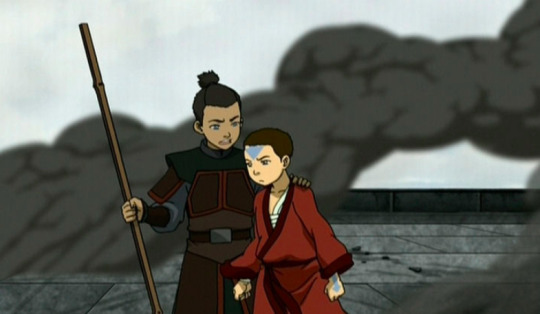
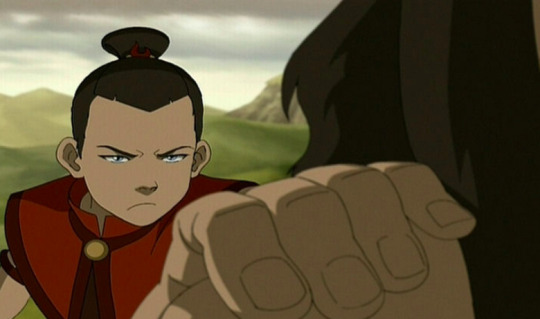
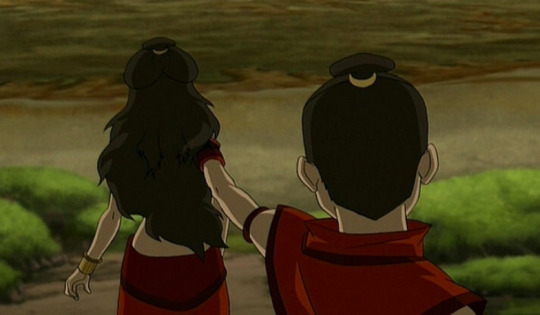
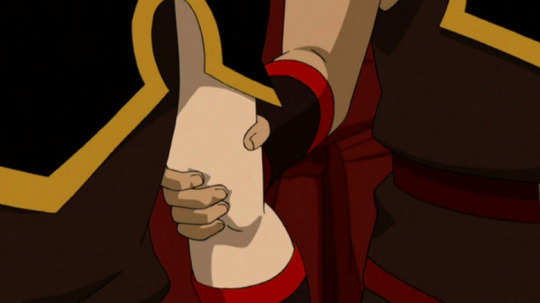
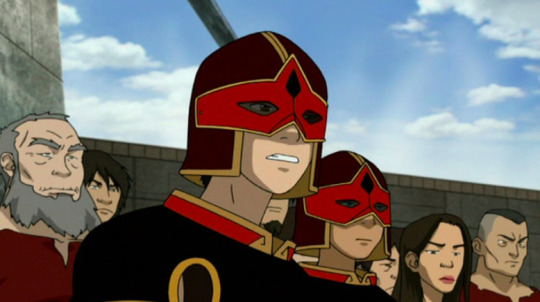
[parallel originally pointed out here]
it goes back to book one the way aang, katara, and zuko are set up to be the main thematic triad of the show, all three of them sharing the qualities of being idealists at heart, generally guided by a strict moral code they impose upon themselves, impulsively heroic at times to the point of naivety, and the belief that they have a great destiny to fulfill, for better or for worse. all of them have a certain legacy, a certain chosen one-ness to them, whether they are aware of the fact the entire time — aang as the avatar and the last airbender; katara as the last southern waterbender — or they have an idea, but aren't aware of the full picture until later on — zuko's legacy from both sozin and roku.
a triad is, of course, not made out of the dynamic of three characters together, but rather the individual pairs, then the function them three manage to balance out. in other words, it does not work like a/b/c but rather a&b / a&c / b&c. aang and zuko share, among many others, the weight of a crucial mistake they made in the past and are desperately trying to fix — mistake that, eventually, leads them to fully become the person they were meant to be; the meaning of identity as what you choose to be every day. zuko and katara share the most intense part of the triad — the rage and grief and anger, as well as the faith, hope, willingness and passion that comes with being a hero; they are the emotional fuel, the drive. aang and katara share the most intimate part of the story; of being a child, and a victim, and standing up despite and maybe because of this — both child survivors of genocide, finding solace in each other as each other's first and best friend, and as a grounding prescence in the midset of the cruel reality of war. when all three different dynamics are combined, you finally get the thematic triad — the three characters that embody the themes and values the show intends to portray and represent. the three of them are indoubtedly the heart of the show, and this is made clear throughout the entire first season. katara as the narrator of the story, aang as the protagonist, zuko as the deuteragonist (as well as antagonist, but in terms of primary titles the deuteragonist always comes first.) they are the most important characters, the basis for every other character that comes after, etc etc.
then there's sokka.
i like to think of sokka as the fourth part of the thematic triangle. he is not essential in the way aang, katara, and zuko are in theory, but he is still immediately established as a main character throughout the first book and accordingly developed in later books 2 and 3. and it works wonders, because while sokka's designated role of the comedic relief character would generally be considered enough to make him a main character, sokka is everything aang, katara, and zuko are not. i'd go as far as to say his entire character is contructed this way.
where aang and katara and zuko are idealists at heart, sokka's pessimism/skepticism is able to protect them from a possible threat their story-structured minds might have not been able to predict, for it might not fit the narrative they construct as it fits the reality of disaster that sokka is very much aware of — which is not to say that aang, katara, and zuko do not know the harsh realities of war, two of them being genocide victims and one of them being pretty much a war veteran, but merely to point out that they believe that somehow, everything will turn out exactly as it has to be above all, while sokka... doesn't, and he approaches every situation as such.
where aang, katara, and zuko are all some sort of chosen one and often act and think according to it, sokka does not have a great destiny to fulfill nor he believes in destiny as a concept. sokka is — self-admittedly — just some guy. the avatar's friend, the last southern waterbender's brother, the son of the chief, etc etc. his strength comes from his unique way of approaching things, his creativity and intelligence and most of all his identity as fundamentally, no one. sokka grew up to believe he was disposable in comparison and he actively worked — possibly even unconsciously — to be important, to be valuable, to be necessary. he was not born great, but achieved greatness, as one might say. the weight of being no one and having to work to become somebody contrasts beautifully with aang's and katara's and zuko's and even toph's inherent specialness, especially mixing up with aang's and zuko's concept of becoming who you are meant to be because of your choices.
where aang and zuko value human life above all else, and katara will never turn her back on people who need her, sokka is never afraid to get a little dirty when he wants things to go his way, or when there's simply more important things for him to worry about. sokka has what i like to call the practical murder syndrome, not necessarily as murder — though he does quite a lot of those and is willing to let zuko, ultimate deuteragonist extraordinarie, die in a blizzard, simply because it's convenient for them at the moment — but also as the way he's not willing to go out of his way to help every wretched village they come into contact with (see: the painted lady). sokka has his moral code, surely, and he has his limits, but while aang's morals, katara's morals, zuko's morals persist through war, pain, and punishment, sokka's morals are shaped by these concepts. this brings a certain balance to the text, to the group dynamic of the gaang, to the main cast in general, and it helps broadening the audience's perception and objectiveness as well. (see: katara is the narrator, and we mostly perceive the first part of the show and most of her relationship with sokka solely through her lens, but in reality sokka was more right than wrong, and that doesn't mean katara was wrong, either. once you watch the show twice, thrice, and you begin watching it objectively, sokka's motivations and general characterization becomes clearer, and makes more sense, despite opposing katara's point of view in so many ways.)
finally, where aang and katara and zuko are impulsively heroic, sokka is a chronic planner and organizer — while katara and aang are focused on fighting the firelord as an idea, sokka worries about how they will fight the firelord, and plans an entire invasion to give aang the window of opportunity to strike the final blow. while aang wants to fight off the fire nation as his duty as the avatar asks of him, sokka knows he's in no condition to fight, and in any case, there's still no need for him to waste his energies in a fight just yet. while katara wants to help people and fight for what's right, sokka needs to remain focused on the big picture, and when this doesn't do anything for katara's heroic nature, sokka offers an elaborate plan to make katara's bringing-of-justice as doable and safe as possible, for everyone involved. while zuko wants to defend his people against the injustices he knows he could have committed in another time, as his first instinct is always help them out, it's always this isn't fair, they deserve better than this, exactly the way he did it when he spoke against the massacre of the 41st division, sokka has to physically restrain him from making the same mistake zuko made at thirteen. because it's not that sokka cares less, but he knows when to care, and the way to do so as safe as possible — sokka is always planning things ahead, one might even say he overthinks, because albeit with a good reason, sokka is, at heart, kind of a coward. he's always tiptoeing between logic and reason, and outright paranoia. he is right to be a coward most of the time, because he knows bravery is a privilege, bravery comes with a price. he is right to be a coward because aang, katara, and zuko are not, and they are right, too.
sokka manages to perfectly balance the thematic triad of the show and its individual double dynamics possibly accidentally and on his own, giving the show its own taste of sokka's arc of broadening perspectives about the world and the people in it. the same way sokka is able to offer the logic and reason heroism often lacks when needed, aang and katara and zuko's idealism and heroism affects sokka in its own way, helping him to let go of this self-critical overthinker who often commits self-sabotage, to become some sort of unconventional hero himself — achieving this balance, undoubtedly makes sokka the fourth part of the thematic triangle.
#iv#i've has this concept in my mind for so long#literally years. sokka was just Something Else you know#sokka#sokka&thegaang#aang&sokka#sokka&katara#sokka&zuko#i am NOT biased enough to tag this beautiful analysis of mine in a shippy way but. just know that i could. i could!!!#atla#n#aang&katara&zuko#< i KNOWW i said aang katara sokka was my favorite triad but i was lying to myself. i was lying!!!#so i'm finding an excuse to use this tag and the excuse is [checks notes] the entire analysis i just made about them. i just keep winning#Yes sokka is my favorite character Yes i would love to hear hours and hours of the interactions between a triad that does not involve him!!#in my defense it was meant this way!!! i am simply. not doing the death of the author today#analysis#01#long post
145 notes
·
View notes
Text
“Midori is Meister’s son,” and other Sou theories
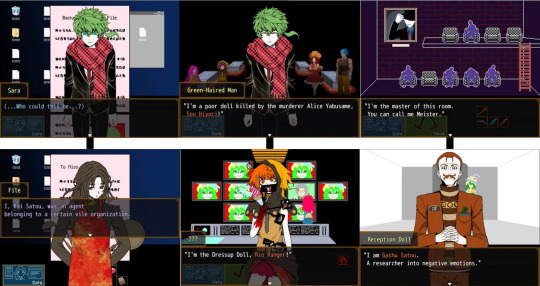
I’ve had a theory for a while that Original Sou is the son of Meister, the likely Mastermind behind the Death Game. I’ve alluded to this theory before, but I haven’t made a proper post for it until now.
I came up with the theory because it’s the easiest way to put Original Sou under Meister’s power and influence. It’s the simplest explanation I can think of for why Original Sou was both an Asu-Naro member and a planned Death Game participant. That’s a strange combination of things to be, but it’s not that strange if that’s what your father raised you to be…
However, there’s more to this theory than a mere hunch. In the first two chapters of YTTD, we learn the story of the Satous: Gashu the father, Kai the human son, and Rio Ranger the doll son. I believe that the story of the Satous is foreshadowing for the story of Sou’s own family.
Gashu is a villain dedicated to the cause of Asu-Naro. He raised Kai to be an Asu-Naro agent. Part of Kai’s job was to watch over Sara, a planned Death Game candidate; he grew to care for her. Kai becomes a participant himself and is one of the Game’s first victims. After Kai dies, we are introduced to Rio Ranger, a sadistic Floor Master. He is a broken doll who wears smiling masks. Rio Ranger is similarly fated to die, and Gashu is then revealed as the father.
Let’s try changing the names in that story. Meister is the main villain behind Asu-Naro. He raised Sou Hiyori to be a top agent. While on the job, Sou developed a close relationship with Shin, a planned Death Game candidate. Sou himself is the first candidate to die, before the Game even begins. However, we meet him again in the “Graveyard of Broken Dolls” as Midori, a sadistic Floor Master who masks his cruelty behind a smile. Midori instructs the participants to kill him… Perhaps leading to a scenario where Meister will finally reveal himself.
I’ll dig into these parallels deeper beneath the cut. But before I go any further, I want to give credit to @joukester who came up with the “Shin was a replacement candidate for Sou” theory, which has influenced my thinking a lot. I also want to credit @novatoast, who pointed out the important Kai parallels and many other ideas to me! I’m very grateful. While Shin is my favorite character, Sou is the character I enjoy speculating about the most. I’m excited to finally share my thoughts on the ramifications of this theory.
Some words on Meister, and the role of the Man from the Memorandum
I should be clear upfront that I think Meister is the Man from the Memorandum, the winner of the Previous Death Game, who loved and lost a “17-year-old School Girl.” I subscribe to the theory that Meister is recreating the Death Game to mold Sara into his beloved High School Girl by putting her through the same trials, and he is hoping she will win this time.
In order to make the perfect recreation, I think the other Death Game participants are also meant to fill in the previous participants’ roles. I believe that Shin fulfills the role of the “Man” himself, which was likely an antagonistic role. However, I believe that Sou was originally meant to play this antagonist role. I think that Shin’s First Trial is so unusual because it was designed to twist Shin into adopting Sou’s personality. That way, he could better play the part.
The first thing we learn about the Man is his confession, “In the first trial, I killed a person.” If Sou had survived to the Death Game, it’s possible that his First Trial would have been to literally kill Shin. Instead, Shin’s First Trial is only that “Sou” metaphorically kills “Shin.”
I want to bring up another possibility for the Man’s role; it may be a doomed role. It’s possible that even if Sou had survived to the Death Game, he might also have had a zero percent chance of survival. The worst outcome for the Mastermind may be seeing a “repeat win” for his own role. While I love the theory that Shin’s zero percent survival rate is due to his own agency (having a self-sacrificial nature), there’s a poignancy to the idea that both Sous turn to villainy out of desperation in the face of certain death. Knowing that the Game is rigged against them in favor of a teenage girl.
Perhaps, even knowing that your own father favors a strange girl over yourself.
Even if the role isn’t necessarily doomed, I think Sou Hiyori still knew more about Meister and the Death Game than any other planned participant. If Meister was Sou’s father, and Sou was serving him faithfully, wouldn’t it make sense for him to be upset that he isn’t the favored “Chosen One”? Knowing that he will someday participate in a Death Game, with a high chance of death, but his father isn’t even rooting for him?
What would that horrible knowledge do to a person?
Kai Satou and Sou Hiyori: Two Different Kinds of Stalkers
Let’s talk about the Human Sons, Kai and Sou. Kai was raised to work for Asu-Naro and he was trained to become an assassin. However, he could never kill a person, and so his ranking in the organization was low. I’m suggesting that Sou was also raised to work for Asu-Naro, but since he took on so many important jobs of manipulating participants’ lives, he was likely in good standing.
The most interesting parallel between these two agents is that they each developed an attachment to another candidate. Kai was instructed to watch over Sara, the strongest candidate, and he grew fond of her from afar. Sara never even knew his name. Although Kai had noble intentions, Sara feared him, and lived with the anxiety of having a stalker.
In contrast, Sou developed an intense, abusive relationship with Shin, the weakest candidate. Instead of keeping his distance while spying on the boy, Sou seems to have become Shin’s closest friend.
Sara and Shin share a similar trauma of feeling stalked. Watching eyes and grabbing hands haunt them.
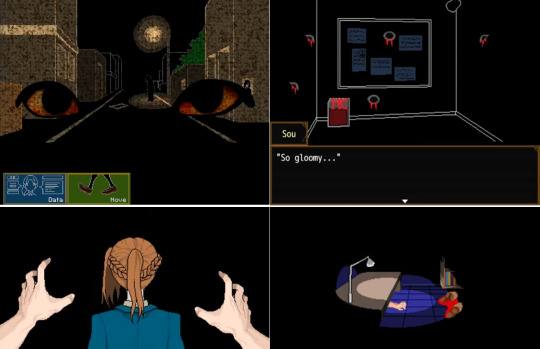
Another clear parallel between the two stalkers is that they both left written accounts of their observations. We see Kai’s notes about Sara on his laptop, and we see Sou’s notes about Shin in his “Shin Tsukimi AI Test Data” book, to Sara and Shin’s chagrin.
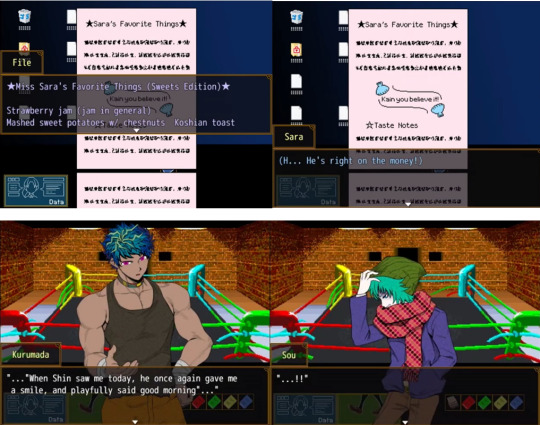
Kai grew an emotional attachment to Sara in spite of his job to watch her. Now the question is, how much of Sou’s relationship with Shin was “strictly business”?
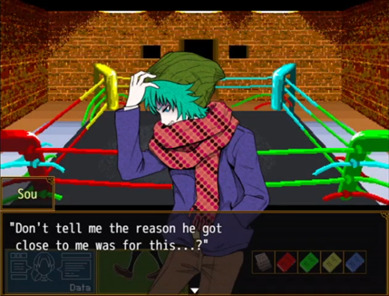
Was Sou’s interest in Shin really all for Asu-Naro? Was he instructed to form such a close relationship with the boy? Or did he also grow close to his chosen candidate in spite of his job? We can’t say for sure yet. However, the closer parallel to Kai would be that Sou’s feelings for Shin became more “personal” than “professional.” Personally, I find it likely that Sou wanted to exercise control over a vulnerable person because he didn’t feel like he had much control over his own life.
I speculate that a major difference between Kai and Sou is knowledge of their fate. I think that Sou grew up knowing that he would one day be a Death Game candidate, while Kai did not know this until the last minute. In a similar way that Shin only becomes a villain if you tell him his survival rate, I think that Kai’s innocence of his fate informed his nobler personality. Meanwhile, Sou’s knowledge of his fate could have harshened him.
How do these two men behave in the face of death?
Death: An act of resistance?
“This is... resistance. Our lives toyed with to our enemy's whims, we are unable to save even a single person... As we die off, this is... my feeble... resistance. But it is one large step... toward counterattack...! It is a step I was able to take... because you bought me time. It is surely... not futile. I entrust them to you...! Our regrets...!! Our hopes...!! I... am satisfied.”
Kai’s suicide in the First Main Game is framed as one of the most courageous acts in the story. Kai takes his life into his own hands, rather than let himself be abused by Asu-Naro a minute longer. He also uses his final words to give an inspirational speech to Sara and entrust his hopes to her. It is a heavy burden for Sara to carry, but she doesn’t have a choice. Nobody has any “easy” choices in this Game.
How does Kai’s death compare to Sou’s death? While Kai took his own life in resistance of Asu-Naro, Sou was murdered by Alice, presumably in service to Asu-Naro.
That’s certainly how it looks…
But what if? What if Sou’s early death was his own form of resistance? What if he deliberately provoked Alice to kill him, knowing that this would mess up the script? Knowing that this would make things more complicated for Meister? Is that so unthinkable?
Why would he do that?
It’s not like Sou’s life was particularly meaningful. He lived in service of an evil organization, possibly with a father who didn’t love him. His only close friendship we know of was with a helpless teenage boy, and Sou treated him terribly.
But…I’d like to share my most outrageous Sou theory, because I might as well go big or go home.
In the same way that Kai entrusted his regrets and hopes to Sara, it’s possible that Sou was entrusting his own regrets and hopes to Shin.
What I’m saying is that: it’s possible that Sou died thinking that his death would give Shin a fighting chance.
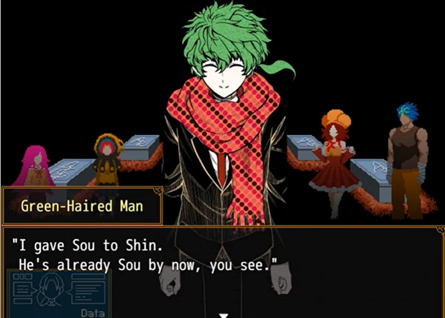
“I gave Sou to Shin. He’s already Sou by now, you see.”
This quote has always stood out to me. From our point of view, it was Shin’s own choice to take Sou’s name! Sou didn’t “give” it to him!
Unless…Sou knew that his own death would force Shin into the Antagonist Role? He might have known that his own First Trial would be to murder Shin, and he wanted to avoid that? He might have wanted Shin’s First Trial to make the young man “stronger”? He may have even liked the idea of Shin carrying on his own name and legacy?
Following this interpretation, it’s possible that Sou rationalized his abuse of Shin was “good” because it would have “prepared” the boy for the upcoming Death Game. Shin ought to learn how cruel people are. From a “friend.” If the story were to actually frame Sou’s abuse of Shin as “teaching Shin,” this would also tie into Shin AI’s line, “Though I learned a lot of things at his house.”
There’s an obvious argument against what I’ve just suggested. It comes from one of Midori’s most memorable lines.
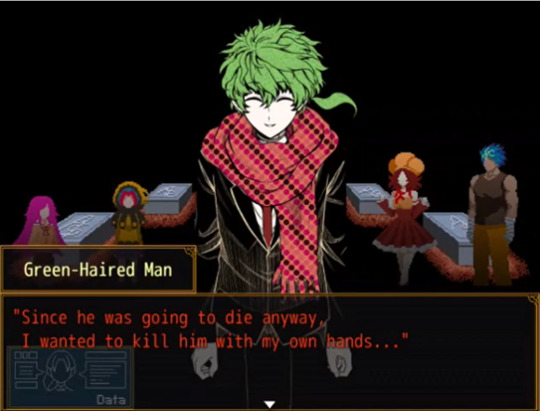
“Since he was going to die anyway, I wanted to kill him with my own hands…”
Midori the doll says cheerfully that he wanted to kill Shin himself. That clearly shows his intentions towards Shin are purely negative. That line is not befitting someone who might have died to “help” a vulnerable person.
However, I have a counterargument for that. It’s that Sou and Midori aren’t the same person. YTTD’s narrative makes it very clear that the dolls and humans can have separate personalities, shown most clearly with Reko and Fake Reko.
And Midori doesn’t parallel Kai. He parallels Rio Ranger.
Rio Ranger and Midori: the sadistic broken dolls
Rio Ranger is an incomplete doll. His father Gashu strongly imbued him with “a strong sense of inferiority, which gave birth to jealousy and hatred.” Gashu also “discarded what [Rio Ranger] originally possessed.” “Kindness… compassion… happiness… / Nearly all of [his] positive emotions.”
I think it is possible that something similar happened to Midori. Sou’s feelings for Shin may have been more complex than simple sadistic pleasure at Shin’s pain. If Sou truly paralleled Kai, he may have had hidden “positive” emotions for Shin as well. Inconvenient, rebellious emotions that Meister would want to “discard.” Leaving Midori as the purely sadistic doll we know now.
I realize that this would be a shockingly positive development for Sou’s character if any of this is true. Original Sou is currently treated as a hate-able joke in the fandom because he is so cartoonishly evil. I feel obligated to say that nothing I’ve written would make Sou’s treatment of Shin “okay.”
And it could be that nothing I just wrote is true! I’m simply drawing parallels with Kai’s death of “resistance” and Rio Ranger’s loss of “positive emotions,” and trying to show the implications of what that could mean for Original Sou and Midori. But it could also be that Nankidai will write Original Sou’s death in an opposite way from Kai, and that Midori is more of a “broken person” instead of a “broken doll.” In fact, my favorite difference between Midori and Rio Ranger is that Ranger only knows what it’s like to be a doll, while Midori has the complex memories of human existence. Honestly, there are many ways Nankidai could approach this. I just don’t know yet.
For example, Original Sou could have even been instructed to allow Alice to kill him. I can’t discount that possibility.
Nankidai could also approach a death of “resistance” in a nuanced way. Perhaps Sou stumbled into conflict with Alice without meaning to take things so far. Like Kai, he didn’t want to die. Perhaps he escalated the tension because he was feeling more emotional than logical. Perhaps he found himself in a fight with a larger man, a fight he couldn’t win, and then he finally started rationalizing to himself that his death could still have meaning. And that meaning could have been a combination of feelings of spite for his job and obsession for his friend.
We do have evidence from Midori’s behavior that he seeks mutually assured destruction, and he even seems masochistic. This could lead to a death of “resistance” which is still very different in tone from Kai’s death.
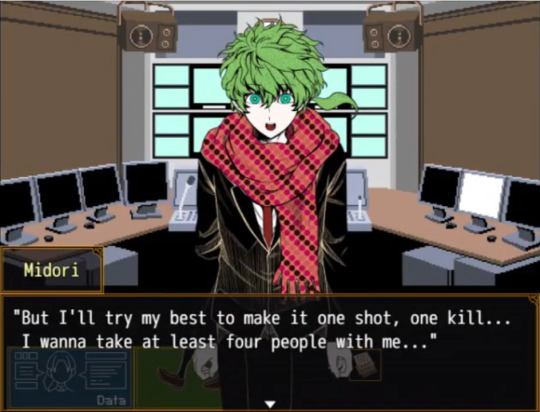
“But I’ll try my best to make it one shot, one kill… I wanna take at least four people with me…”
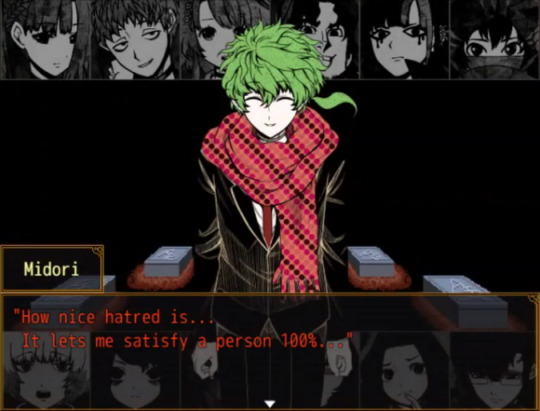
“How nice hatred is… It lets me satisfy a person 100%...”
I do think that the only interesting thing to do with Midori’s character is to humanize him. He could get sympathetic traits to make him feel more realistic. I think this could even make him scarier! What’s most frightening about the character isn’t his campy villainous vibe; it’s the fact that he’s an abuser. And abusers use sympathy to get what they want.
Rio Ranger is mostly demonic in the story until we finally learn about his father, Gashu, who “puts Ranger in his place” by killing him. Something similar may happen with Midori.
Conclusions
This is getting long and I’ve already written about the most interesting potential parallels between Sou and the Satou brothers, so I’ll wrap things up.
The reason I find Sou/Midori so fascinating is because he is a man of many contradictions. He is a participant and floor master, alive and dead, aggressor and victim. He could be a victim within the cycle of abuse himself, if they develop his relationship with Meister as much as I’m speculating.
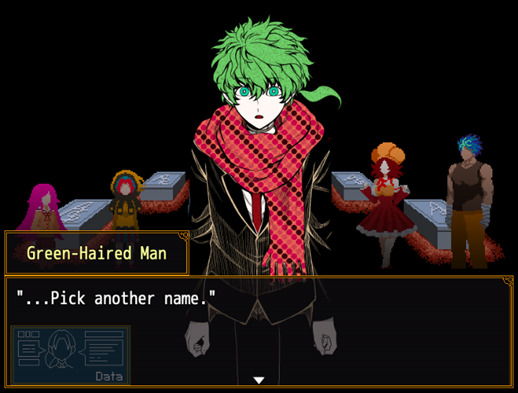
Even if my theories and conclusions are wrong, the parallels between Sou Hiyori and the Satou brothers still exist. We have two Asu-Naro agents who developed an attachment to a candidate before becoming early victims. We have two “broken” sadistic doll floor masters. I feel instinctively that these parallels must mean something. I want to think that the parallels mean that Sou could have a father figure, similar to Gashu, and the most likely candidate is Meister. We can also use these parallels to infer how Sou/Midori could be written to be a more complex character.
Thank you for reading!! @ Nankidai good luck writing this bastard.
#yttd#your turn to die#kimi ga shine#your turn to die spoilers#sou hiyori#shin tsukimi#sara chidouin#kai satou#rio ranger#gashu satou#meister#sou and midori#sara and kai#sou and sara#satou brothers#midori and meister#mine#meta#theories#this is about ~2700 words...whew!
169 notes
·
View notes